- Extremes and Natural Hazards
- Adaptation Science
- Earth Data Across Scales
- Earth Data Science Education
- Earth Analytics
- Landscape Dynamics
- Partnerships
- Earth Analytics Professional Certificate
- Environmental Data Science Seminar Series
- Post Docs and Graduate Students
- Earth Data Science Corps
- How to Engage
- Learning Portal

How to Write a Good Cover Letter for a Research Position
Writing a cover letter can be intimidating, but it doesn’t have to be!
Some people believe cover letters are a science. Others seem to think they are more akin to black magic. Regardless of how you feel about cover letters, they are one of the most important parts of the job application process. Your resume or CV may get you an interview, but a good cover letter is what ensures that the hiring manager reads your resume in the first place.
Writing a cover letter for any job is important, but the art of writing a good cover letter for a research position can make or break your application. While writing a cover letter for a research position, you have to walk a fine line of proving your expertise and passion while limiting jargon and dense language.
In this post, we will explain cover letter writing basics, and then dive into how to write a research specific cover letter with examples of both good and bad practices.

What Is A Cover Letter and Why Do Cover Letters Matter?
A cover letter is your opportunity to tell a story and connect the dots of your resume. Resumes and curriculum vitae (CVs) are often cold and static—they don’t show any sort of character that will give companies a hint about if you will fit in with their culture.
Your cover letter gives you the chance to demonstrate that you are an interesting, qualified, and intelligent person. Without proving that you are worth the time to interview, a company or research organization will set your application in the rejection pile without giving it a second look.
So, what is a cover letter, exactly? It is an explanation (written out in paragraph form) of what you can bring to the company that goes beyond the information in your resume. Cover letters give a company a glimpse into the qualities that will make you the ideal candidate for their opening.
Note that a cover letter is not the same as a letter of intent. A cover letter is written for a specific job opening. For example, if I got an email saying that the University of Colorado was looking for a tenure track faculty member to teach GEO 1001, and I chose to apply, I would write a cover letter.
A letter of intent, however, is written regardless of the job opening. It is intended to express an interest in working at a particular company or with a particular group. The goal of a letter of intent is to demonstrate your interest in the company (or whatever type of group you are appealing to) and illustrate that you are willing to work with them in whatever capacity they feel is best.
For example, if I loved the clothing company, Patagonia and wanted to work there, I could write a letter of intent. They may have an opening for a sales floor associate, but after reading my application and letter of intent, decide I would be better suited to a design position. Or, they may not have any positions open at all, but choose to keep my resume on hand for the next time they do.
Most organizations want a cover letter, not a letter of intent, so it is important to make sure your cover letter caters to the specifics of the job posting. A cover letter should also demonstrate why you want to work at the company, but it should be primarily focused on why you can do the job better than any of the other applicants.
How to Write a Good Cover Letter: The Basics
Writing a cover letter isn’t hard. Writing a good cover letter, a cover letter that will encourage a hiring manager to look at your application and schedule an interview, is more difficult (but certainly not impossible). Below, we will go over each of the important parts of a cover letter: the salutation, introduction, body, and conclusion, as well as some other best practices.
How to Write a Good Cover Letter Salutation
Don’t start with “Dear Sir/Ma’am” (or any iteration of a vague greeting, including “to whom it may concern”). Avoiding vague greetings is the oldest trick in the book, but it still holds a lot of weight. Starting a cover letter with the above phrase is pretty much stamping “I didn’t bother to research this company at all because I am sending out a million generic cover letters” across your application. It doesn’t look good.
The best practice is to do your research and use your connections to find a name. “Dear Joe McGlinchy” means a lot more than “Dear Hiring Manager.” LinkedIn is a great tool for this—you can look up the company, then look through the employees until you find someone that seems like they hire for the relevant department.
The most important thing about the salutation is to address a real human. By selecting someone in the company, you’ve demonstrated that you’ve done some research and are actually interested in this company specifically. Generic greetings aren’t eye-catching and don’t do well.
How to Write a Good Cover Letter Introduction
Once you’ve addressed your cover letter to a real human being, you need a powerful introduction to prove that this cover letter is worth the time it will take to read. This means that you need a hook.
Your first sentence needs to be a strong starter, something to encourage the hiring manager not only to continue reading the cover letter, but to look at your application as well. If you have a contact in the company, you should mention them in the first sentence. Something along the lines of “my friend, Amanda Rice (UX/UI manager), suggested I apply for the natural language processing expert position after we worked together on a highly successful independent project.”
The example above uses a few techniques. The name drop is good, but that only works if you actually have a connection in the company. Beyond that, this example has two strengths. First, it states the name of the position. This is important because hiring managers can be hiring for several different positions at a time, and by immediately clarifying which position you are applying for, you make their job a little bit easier. Next, this sentence introduces concrete skills that apply to the job. That is a good way to start because it begins leading into the body, where you will go into depth about how exactly your experience and skills make you perfect for the job.
Another technique for a strong lead-in to a cover letter is to begin with an applicable personal experience or anecdote. This attracts more attention than stereotypical intros (like the example above), but you have to be careful to get to the point quickly. Give yourself one or two sentences to tell the story and prove your point before you dive into your skills and the main body of the cover letter.
A more standard technique for introductions is simply expressing excitement. No matter how you choose to start, you want to demonstrate that you are eager about the position, and there is no easier way to do that than just saying it. This could take the form of “When I saw the description for X job on LinkedIn, I was thrilled: it is the perfect job for my Y skills and Z experience.” This option is simple and to-the-point, which can be refreshing for time-crunched hiring managers.
Since we’ve provided a few good examples, we will offer a bad example, so you can compare and contrast. Don’t write anything along the line of: “My name is John Doe, and I am writing to express my interest in the open position at your company.”
There are a few issues here. First, they can probably figure out your name. You don’t need that to be in the first sentence (or any of the sentences—the closing is an obvious enough spot). Next, “the open position” and “your company” are too generic. That sounds like the same cover letter you sent to every single employer in a hundred mile radius. Give the specifics! Finally, try to start with a little more spice. Add in some personality, something to keep the hiring manager reading. If you bore them to death in the first line, they aren’t going to look over your resume and application with the attention they deserve.
How to Write a Good Cover Letter Body
So, you’ve addressed a real human being, and you’ve snagged their attention with a killer opening line. What next? Well, you have to hold on to that attention by writing an engaging and informative cover letter body.
The body of a cover letter is the core of the important information you want to transmit. The introduction’s job was to snag the attention of the hiring manager. The body’s job is to sell them on your skills. There are a few formatting things to be aware of before we start talking about what content belongs in the body of the cover letter. First, keep the company culture and standards in mind when picking a format. For example, if I want to work for a tech startup that is known for its wit and company culture, I can probably get away with using a bulleted list or another informal format. However, if I am applying to a respected research institution, using a standard five paragraph format is best.
In addition, the cover letter should not be longer than a page. Hiring managers are busy people. They may have hundreds of resumes to read, so they don’t need a three page essay per person. A full page is plenty, and many hiring managers report finding three hundred words or less to be the idea length. Just to put that into context, the text from here to the “How to Write a Good Cover Letter Body” header below is about perfect, length-wise.
Now, on to the more important part: the content. A cover letter should work in tandem with a resume. If you have a list of job experiences on your resume, don’t list them again in the cover letter. Use the valuable space in the cover letter to give examples about how you have applied your skills and experience.
For example, if I have worked as a barista, I wouldn’t just say “I have worked as a barista at Generic Cafe.” The hiring manager could learn that from my resume. Instead, I could say “Working as a barista at Generic Cafe taught me to operate under pressure without feeling flustered. Once…” I would go on to recount a short story that illustrated my ability to work well under pressure. It is important that the stories and details you choose to include are directly related to the specific job. Don’t ramble or add anything that isn’t obviously connected. Use the job description as a tool—if it mentions a certain skill a few times, make sure to include it!
If you can match the voice and tone of your cover letter to the voice of the company, that usually earns you extra points. If, in their communications, they use wit, feel free to include it in your letter as well. If they are dry, to the point, and serious, cracking jokes is not the best technique.
A Few Don’ts of Writing a Cover Letter Body
There are a few simple “don’ts” in cover letter writing. Do not:
- Bad: I am smart, dedicated, determined, and funny.
- Better: When I was working at Tech Company, I designed and created an entirely new workflow that cut the product delivery time in half.
- Bad: When I was seven, I really loved the monkeys at the zoo. This demonstrates my fun-loving nature.
- Better: While working for This Company, I realized I was far more productive if I was light-hearted. I became known as the person to turn to in my unit when my coworkers needed a boost, and as my team adopted my ideology, we exceeded our sales goals by 200%.
- Bad: I would love this job because it would propel me to the next stage of my career.
- Better: With my decade of industry experience communicating with engineers and clients, I am the right person to manage X team.
- Bad: I know I’m not the most qualified candidate for this job, but…
- Better: I can apply my years of experience as an X to this position, using my skills in Y and Z to…
- Bad: I am a thirty year old white woman from Denver…
- Better: I have extensive experience managing diverse international teams, as illustrated by the time I…
The most important part of the cover letter is the body. Sell your skills by telling stories, but walk the razor’s edge between saying too much and not enough. When in doubt, lean towards not enough—it is better for the hiring manager to call you in for an interview to learn more than to bore them.
How to Write a Good Cover Letter Conclusion
The last lines of a cover letter are extremely important. Until you can meet in-person for an interview, the conclusion of your cover letter will greatly affect the impression the hiring manager has of you. A good technique for concluding your cover letter is to summarize, in a sentence, what value you can bring to the company and why you are perfect for the position. Sum up the most important points from your cover letter in a short, concise manner.
Write with confidence, but not arrogance. This can be a delicate balance. While some people have gotten away (and sometimes gotten a job) with remarks like, “I’ll be expecting the job offer soon,” most do not. Closing with a courteous statement that showcases your capability and skills is far more effective than arrogance. Try to avoid trite or generic statements in the closing sentence as well. This includes the template, “I am very excited to work for XYZ Company.” Give the hiring manager something to remember and close with what you can offer the company.
The final step in any cover letter is to edit. Re-read your cover letter. Then, set it aside for a few hours (or days, time permitting) and read it again. Give it to a friend to read. Read it aloud. This may seem excessive, but there is nothing more off-putting than a spelling or grammar error in the first few lines of a cover letter. The hiring manager may power through and ignore it, but it will certainly taint their impression.
Once the cover letter is as flawless and compelling as it can be, send it out! If you are super stuck on how to get started, working within a template may help. Microsoft Word has many free templates that are aesthetically appealing and can give you a hint to the length and content. A few good online options live here (free options are at the bottom—there is no reason to pay for a resume template).
How to Write a Cover Letter for a Research Position
Writing a cover letter for a research position is the same as writing any other cover letter. There are, however, a few considerations and additions that are worth pointing out. A job description may not directly ask for a cover letter, but it is good practice to send one unless they specifically say not to. This means that even if a cover letter isn’t mentioned, you should send one—it is best practice and gives you an opportunity to expand on your skills and research in a valuable way.
Format and Writing Style for a Research Position Cover Letter
Research and academics tend to appreciate formality more than start-ups or tech companies, so using the traditional five paragraph format is typically a good idea. The five paragraph format usually includes an introduction, three short examples of skills, and a concluding paragraph. This isn’t set in stone—if you’d rather write two paragraphs about the skills and experience you bring to the company, that is fine.
Keep in mind that concise and to-the-point writing is extremely valuable in research. Anyone who has ever written a project proposal under 300 words knows that every term needs to add value. Proving that you are a skilled writer, starting in your cover letter, will earn you a lot of points. This means that cover letters in research and academia, though you may have more to say, should actually be shorter than others. Think of the hiring manager—they are plowing through a massive stack of verbose, technical, and complex cover letters and CVs. It is refreshing to find an easy to read, short cover letter.
On the “easy to read” point, remember that the hiring manager may not be an expert in your field. Even if they are, you cannot assume that they have the exact same linguistic and educational background as you. For example, if you have dedicated the last five years of your life to studying a certain species of bacteria that lives on Red-Eyed Tree Frogs, all of those technical terms you have learned (and maybe even coined) have no place in your cover letter. Keep jargon to an absolute minimum. Consider using a tool like the Hemingway Editor to identify and eliminate jargon. While you want to reduce jargon, it is still important to prove that you’ve researched their research. Passion about the research topic is one of the most valuable attributes that a new hire can offer.
Use your cover letter to prove that you have done your homework, know exactly what the institution or group is doing, and want to join them. If you have questions about the research or want to learn more, it isn’t a bad idea to get in touch with one of the researchers. You can often use LinkedIn or the group’s staff site to learn who is working on the project and reach out.
What Research Information Should be Included in a Cover Letter
A research position cover letter is not the place for your academic history, dissertation, or publications. While it may be tempting to go into detail about the amazing research you did for your thesis, that belongs in your CV. Details like this will make your cover letter too long. While these are valuable accomplishments, don’t include them unless there is something that pertains to the group’s research, and your CV doesn’t cover it in depth.
If you do choose to write about your research, write about concrete details and skills that aren’t in your CV. For example, if you have spent the last few years working on identifying the effects of a certain gene sequence in bird migration, include information about the lab techniques you used. Also, try to put emphasis on the aspects of your resume and CV that make you stand out from other candidates. It is likely that you will be competing with many similarly qualified candidates, so if you have a unique skill or experience, make sure it doesn’t get lost in the chaos—a cover letter is the perfect place to highlight these sorts of skills.
Industry experience is a great differentiator. If you have relevant industry experience, make sure to include it in your cover letter because it will almost certainly set you apart. Another valuable differentiator is a deep and established research network. If you have been working on research teams for years and have deep connections with other scientists, don’t be afraid to include this information. This makes you a very valuable acquisition for the company because you come with an extensive network
Include Soft Skills in Your Cover Letter
Scientific skills aren’t the only consideration for hiring managers. Experience working with and leading teams is incredibly valuable in the research industry. Even if the job description doesn’t mention teamwork, add a story or description of a time you worked with (or, even better, lead) a successful team. Soft skills like management, customer service, writing, and clear communication are important in research positions. Highlight these abilities and experiences in your cover letter in addition to the hard skills and research-based information.
If you are struggling to edit and polish your letter, give it to both someone within your field and someone who is completely unfamiliar with your research (or, at least, the technical side of it). Once both of those people say that the letter makes sense and is compelling, you should feel confident submitting it.
Cover letters are intended to give hiring managers information beyond what your resume and CV are able to display. Write with a natural but appropriately formal voice, do your research on the position, and cater to the job description. A good cover letter can go a long way to getting you an interview, and with these tips, your cover letters will certainly stand out of the pile.
Related Articles
Diversity, equity, justice & inclusion in the earth observation sector.

Cibele Amaral
Earth Data Science And The Open Education Movement

Ally Faller

Lauren Herwehe

Nathan A. Quarderer
The Midwest Big Data Innovations Hub & Data for Good for Education

Casey Jenson
Certificate Form

Research Scientist Cover Letter Examples (Template & 20+ Tips)
Create a standout research scientist cover letter with our online platform. browse professional templates for all levels and specialties. land your dream role today.
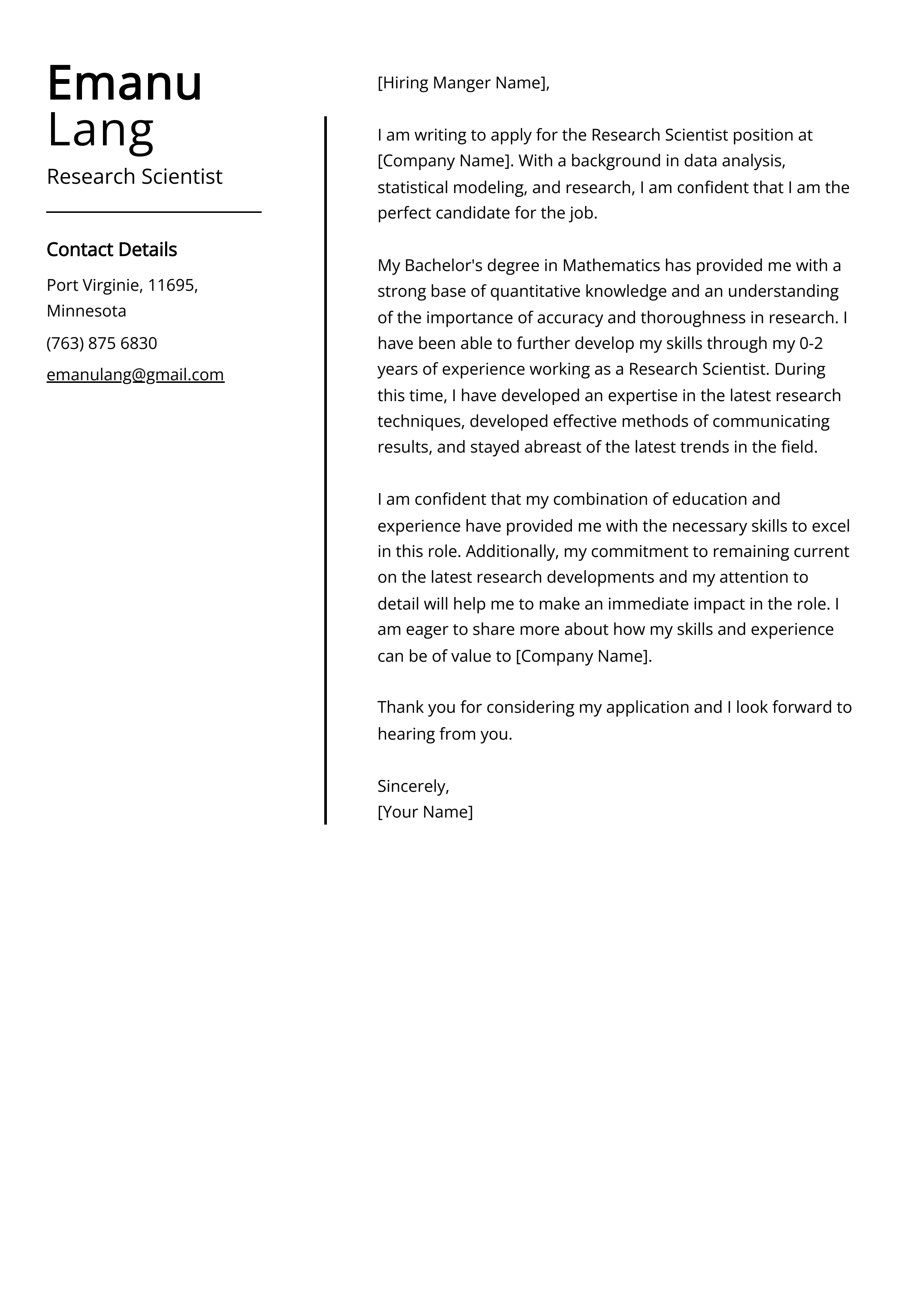
Are you looking to stand out from the competition and land that dream job as a Research Scientist? Our Research Scientist Cover Letter Guide is here to help you do just that. Get tips on how to write a compelling cover letter, key elements to include and important considerations for advancing your career.
We will cover:
- How to write a cover letter, no matter your industry or job title.
- What to put on a cover letter to stand out.
- The top skills employers from every industry want to see.
- How to build a cover letter fast with our professional Cover Letter Builder .
- What a cover letter template is, and why you should use it.
Related Cover Letter Examples
- Backend Developer Cover Letter Sample
- Energy Engineer Cover Letter Sample
- Engineering Assistant Cover Letter Sample
- Energy Consultant Cover Letter Sample
- Chemist Cover Letter Sample
- Embedded Engineer Cover Letter Sample
- Stationary Engineer Cover Letter Sample
- CAD Engineer Cover Letter Sample
- Automation Engineer Cover Letter Sample
- Asic Verification Engineer Cover Letter Sample
- Helicopter Pilot Cover Letter Sample
- Implementation Engineer Cover Letter Sample
- Equipment Engineer Cover Letter Sample
- Analytical Scientist Cover Letter Sample
- Biologist Cover Letter Sample
- Energy Analyst Cover Letter Sample
- Principal Electrical Engineer Cover Letter Sample
- Lead Software Engineer Cover Letter Sample
- Industrial Electrician Cover Letter Sample
- QA Software Tester Cover Letter Sample
Research Scientist Cover Letter Sample
Dear Dr. Smith, I am writing to apply for the Research Scientist position at ABC Company as advertised in the Times newspaper. With my strong background in scientific research, I am confident that I would be a great fit for your team.
I am currently employed as a Research Scientist at XYZ Company, where I have gained extensive experience in data collection, analysis, and interpretation. During my time at XYZ Company, I developed a number of innovative solutions to complex research problems, and I am proud to say that my research has been published in several leading scientific journals. Additionally, I have presented my findings at several international conferences and have won a number of awards for my research.
In addition to my scientific research experience, I am also highly skilled in the areas of data analysis, statistical modeling, and laboratory techniques. I have a deep understanding of the principles of scientific research and I am always looking for ways to further develop my skills. I am also highly organized and have excellent interpersonal and communication skills, which are essential for working in a research team.
I am confident that I have the skills and experience necessary to be a great addition to ABC Company as a Research Scientist. I am excited at the prospect of joining your team and contributing to the success of your research projects.
If you would like to discuss my application further, please do not hesitate to contact me. I look forward to hearing from you.
Sincerely, [Your Name]
Why Do you Need a Research Scientist Cover Letter?
A Research Scientist cover letter is an important tool for any job seeker looking to break into the field of research. Here are some reasons why you need a Research Scientist cover letter:
- It is an excellent way to introduce yourself to potential employers and showcase your qualifications for the position.
- It can help to demonstrate your knowledge and experience in the field of research.
- It can help to demonstrate your enthusiasm and passion for the field of research.
- It can help to showcase your communication and interpersonal skills.
- It can help to demonstrate your ability to think critically and solve problems.
- It can help to highlight any awards or recognition you have received.
- It can help to draw attention to any publications or presentations you have given.
- It can help to demonstrate your commitment to the field of research.
A Few Important Rules To Keep In Mind
- Keep your cover letter short and concise. Generally, research scientist cover letters should be no more than one page.
- Start the cover letter with a strong introduction that outlines your qualifications and expertise.
- Include your contact information in the header of the cover letter.
- Provide a brief overview of the research experience you have that is relevant to the research scientist position.
- Highlight your impressive qualifications and achievements in research, such as awards or publications.
- Explain why you are the best candidate for the research scientist position and how your skills and experience will benefit the organization.
- End the cover letter by reiterating your interest in the research scientist position and expressing appreciation for the hiring manager’s time.
- Proofread the cover letter to ensure there are no spelling or grammar errors.
What's The Best Structure For Research Scientist Cover Letters?
After creating an impressive Research Scientist resume , the next step is crafting a compelling cover letter to accompany your job applications. It's essential to remember that your cover letter should maintain a formal tone and follow a recommended structure. But what exactly does this structure entail, and what key elements should be included in a Research Scientist cover letter? Let's explore the guidelines and components that will make your cover letter stand out.
Key Components For Research Scientist Cover Letters:
- Your contact information, including the date of writing
- The recipient's details, such as the company's name and the name of the addressee
- A professional greeting or salutation, like "Dear Mr. Levi,"
- An attention-grabbing opening statement to captivate the reader's interest
- A concise paragraph explaining why you are an excellent fit for the role
- Another paragraph highlighting why the position aligns with your career goals and aspirations
- A closing statement that reinforces your enthusiasm and suitability for the role
- A complimentary closing, such as "Regards" or "Sincerely," followed by your name
- An optional postscript (P.S.) to add a brief, impactful note or mention any additional relevant information.
Cover Letter Header
A header in a cover letter should typically include the following information:
- Your Full Name: Begin with your first and last name, written in a clear and legible format.
- Contact Information: Include your phone number, email address, and optionally, your mailing address. Providing multiple methods of contact ensures that the hiring manager can reach you easily.
- Date: Add the date on which you are writing the cover letter. This helps establish the timeline of your application.
It's important to place the header at the top of the cover letter, aligning it to the left or center of the page. This ensures that the reader can quickly identify your contact details and know when the cover letter was written.
Cover Letter Greeting / Salutation
A greeting in a cover letter should contain the following elements:
- Personalized Salutation: Address the hiring manager or the specific recipient of the cover letter by their name. If the name is not mentioned in the job posting or you are unsure about the recipient's name, it's acceptable to use a general salutation such as "Dear Hiring Manager" or "Dear [Company Name] Recruiting Team."
- Professional Tone: Maintain a formal and respectful tone throughout the greeting. Avoid using overly casual language or informal expressions.
- Correct Spelling and Title: Double-check the spelling of the recipient's name and ensure that you use the appropriate title (e.g., Mr., Ms., Dr., or Professor) if applicable. This shows attention to detail and professionalism.
For example, a suitable greeting could be "Dear Ms. Johnson," or "Dear Hiring Manager," depending on the information available. It's important to tailor the greeting to the specific recipient to create a personalized and professional tone for your cover letter.
Cover Letter Introduction
An introduction for a cover letter should capture the reader's attention and provide a brief overview of your background and interest in the position. Here's how an effective introduction should look:
- Opening Statement: Start with a strong opening sentence that immediately grabs the reader's attention. Consider mentioning your enthusiasm for the job opportunity or any specific aspect of the company or organization that sparked your interest.
- Brief Introduction: Provide a concise introduction of yourself and mention the specific position you are applying for. Include any relevant background information, such as your current role, educational background, or notable achievements that are directly related to the position.
- Connection to the Company: Demonstrate your knowledge of the company or organization and establish a connection between your skills and experiences with their mission, values, or industry. Showcasing your understanding and alignment with their goals helps to emphasize your fit for the role.
- Engaging Hook: Consider including a compelling sentence or two that highlights your unique selling points or key qualifications that make you stand out from other candidates. This can be a specific accomplishment, a relevant skill, or an experience that demonstrates your value as a potential employee.
- Transition to the Body: Conclude the introduction by smoothly transitioning to the main body of the cover letter, where you will provide more detailed information about your qualifications, experiences, and how they align with the requirements of the position.
By following these guidelines, your cover letter introduction will make a strong first impression and set the stage for the rest of your application.
Cover Letter Body
Dear [Name],
I am writing to apply for the Research Scientist position you have advertised. I am confident that my qualifications and experience make me an ideal candidate for this role.
I have a Doctorate in [Subject] and over [Number] years of experience in scientific research. I have published several papers in renowned scientific journals and regularly attend conferences to stay up to date with the latest developments in the field. I have also been involved in developing innovative methods and approaches to solve complex problems. I have extensive experience in laboratory work and am highly skilled in the use of analytical instruments and software.
In my current role as a Research Scientist at [Company], I have been responsible for developing and validating new methods for testing and analysing data. I have also been involved in designing and conducting experiments, managing projects, and writing technical reports. I have a proven record of success in delivering results and developing new ideas.
I am a self-motivated and creative thinker who works well independently and collaboratively. I am highly organised and have excellent communication and interpersonal skills that enable me to build good working relationships with colleagues. I am also comfortable working with tight deadlines and under pressure.
I am confident that I would make a valuable contribution to your team and I look forward to discussing my candidacy further. Please find enclosed my CV and I am happy to provide any additional information you may need.
Thank you for your time and consideration.
Complimentary Close
The conclusion and signature of a cover letter provide a final opportunity to leave a positive impression and invite further action. Here's how the conclusion and signature of a cover letter should look:
- Summary of Interest: In the conclusion paragraph, summarize your interest in the position and reiterate your enthusiasm for the opportunity to contribute to the organization or school. Emphasize the value you can bring to the role and briefly mention your key qualifications or unique selling points.
- Appreciation and Gratitude: Express appreciation for the reader's time and consideration in reviewing your application. Thank them for the opportunity to be considered for the position and acknowledge any additional materials or documents you have included, such as references or a portfolio.
- Call to Action: Conclude the cover letter with a clear call to action. Indicate your availability for an interview or express your interest in discussing the opportunity further. Encourage the reader to contact you to schedule a meeting or provide any additional information they may require.
- Complimentary Closing: Choose a professional and appropriate complimentary closing to end your cover letter, such as "Sincerely," "Best Regards," or "Thank you." Ensure the closing reflects the overall tone and formality of the letter.
- Signature: Below the complimentary closing, leave space for your handwritten signature. Sign your name in ink using a legible and professional style. If you are submitting a digital or typed cover letter, you can simply type your full name.
- Typed Name: Beneath your signature, type your full name in a clear and readable font. This allows for easy identification and ensures clarity in case the handwritten signature is not clear.
Common Mistakes to Avoid When Writing a Research Scientist Cover Letter
When crafting a cover letter, it's essential to present yourself in the best possible light to potential employers. However, there are common mistakes that can hinder your chances of making a strong impression. By being aware of these pitfalls and avoiding them, you can ensure that your cover letter effectively highlights your qualifications and stands out from the competition. In this article, we will explore some of the most common mistakes to avoid when writing a cover letter, providing you with valuable insights and practical tips to help you create a compelling and impactful introduction that captures the attention of hiring managers. Whether you're a seasoned professional or just starting your career journey, understanding these mistakes will greatly enhance your chances of success in the job application process. So, let's dive in and discover how to steer clear of these common missteps and create a standout cover letter that gets you noticed by potential employers.
- Not addressing the letter to a specific person.
- Not customizing the letter to the specific position.
- Using overly generic language and not specifically highlighting relevant skills or research.
- Lengthy cover letters that don't get to the point.
- Being overly negative about past experiences.
- Not proofreading for spelling and grammar errors.
- Not including contact information at the end.
- Failing to follow directions.
Key Takeaways For a Research Scientist Cover Letter
- Demonstrate your understanding of the research scientist role and the company
- Highlight your research accomplishments and relevant experience
- Showcase any awards, publications, and patents you have earned
- Emphasize your knowledge of the industry, trends, and technologies
- Communicate your passion for research and development
- Describe your ability to collaborate in a research environment
- Express your enthusiasm for the position and the organization
- Proofread your letter and use proper grammar and spelling

Researcher cover letter examples
Your head is already bursting with knowledge, but you love nothing more than doing your research and gathering new information.
Well, it’s time to put those research skills to use to find out more about the company and what the employer expects from your application.
In our guide below, we’ll show you what to include in your cover letter and how to use your research to your advantage. Check out our top tips and researcher cover letter examples below.
CV templates
Researcher cover letter example 1
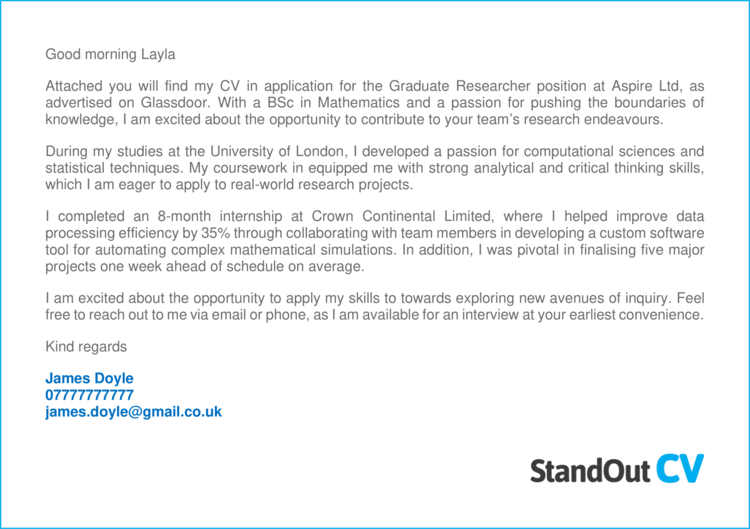
Researcher cover letter example 2
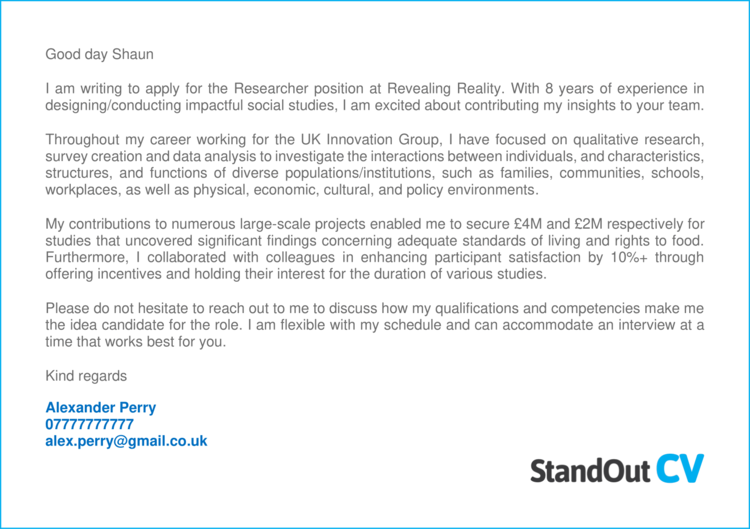
Researcher cover letter example 3
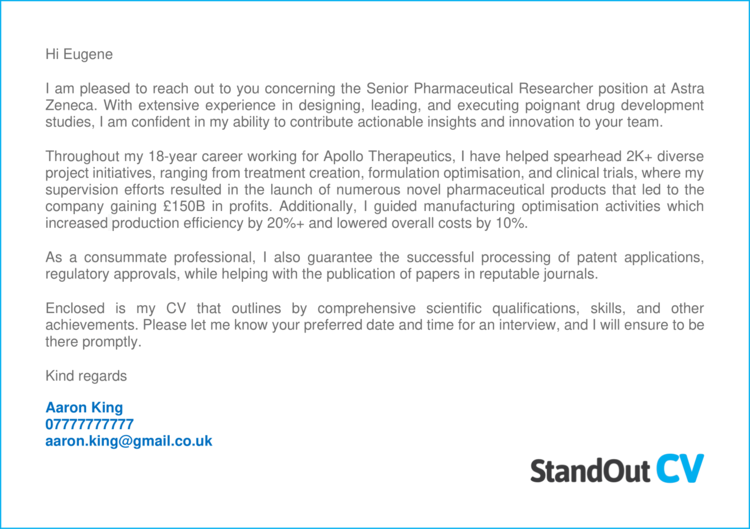
The example cover letters here should give you a good general idea on how your Researcher cover letter should be formatted and written.
The rest of this guide gives more specific guidance on how to create your own cover letter in this format, and even includes some templates you can copy and paste.
How to write a Researcher cover letter
Here’s how you can write your own eye-catching cover letter, broken down into simple steps.

Write your cover letter in the body of an email/message
When you send a cover letter with a job application, you should always write your message into the body of your email – or the body of the messaging system if you are sending via a job website.
Why do this?
Simply because you want to get your message seen as soon as the recruiter opens your application.
If you attach the cover letter as a separate item, this means the recipient will have to open it before they can read it – slowing down the process and potentially causing frustration along the way.
So, write your cover note in the body of your email/message to ensure you make an instant connection with the reader.

Start with a friendly greeting

Start you cover letter with a greeting that is professional but friendly.
This will build rapport with the recruiter whilst showing your professionalism.
- Hi, hope you’re well
- Hi [insert recruiter name]
- Hi [insert department/team name]
Avoid overly formal greetings like “Dear sir/madam ” unless applying to very traditional companies.
How to find the contact’s name?
Addressing the recruitment contact by name is an excellent way to start building a strong relationship. If it is not listed in the job advert, try these methods to find it.
- Check out the company website and look at their About page. If you see a hiring manager, HR person or internal recruiter, use their name. You could also try to figure out who would be your manager in the role and use their name.
- Head to LinkedIn , search for the company and scan through the list of employees. Most professionals are on LinkedIn these days, so this is a good bet.
Identify the role you are applying for
Once you’ve opened up the cover letter with a warm greeting to start building a relationship, it is time to identify which role you want to apply for.
Recruiters are often managing multiple vacancies, so you need to ensure you apply to the correct one.
Be very specific and use a reference number if you can find one.
- I am interested in applying for the position of Researcher with your company.
- I would like to apply for the role of Sales assistant (Ref: 406f57393)
- I would like to express my interest in the customer service vacancy within your retail department
- I saw your advert for a junior project manager on Reed and would like to apply for the role.
See also: CV examples – how to write a CV – CV profiles
Highlight your suitability
The bulk of your cover letter should be focused around highlighting your suitability for the job you are applying to.
Doing this will show the recruiter that you are suitable candidate and encourage them to open your CV.
The best way to do this, is by studying the job advert you are applying to, and find out what the most important skills and knowledge are.
Once you know the most important requirements, you then need to highlight your matching skills to the recruiter. In a few sentences, tell them exactly why you are a good fit for the job and what you can offer the company.

Keep it short and sharp
When sending a job application to a recruiter or hiring manager, it is important to remember that they will normally be very busy and pushed for time.
Therefore, you need to get you message across to them quickly (in a matter of seconds ideally). So, keep your cover letter short and to-the-point. A long waffling cover letter will overwhelm recruiters when they are running through hundreds of emails in there inbox, but a concise one will get their attention.
So, keep your cover letter to just a few sentences long, and save the extensive detail for your CV.
Sign off professionally
To finish off your cover note, add a professional signature to the bottom, stating your important contact details and information.
This not only provides recruiters with multiple means of contacting you, but it also adds a nice professional appearance to the cover letter, which shows that you know how to conduct yourself in the workplace.
Include the following points;
- A friendly sign off – e.g. “Warm regards”
- Your full name
- Phone number (one you can answer quickly)
- Email address
- Profession title
- Professional social network – e.g. LinkedIn
Here is an example signature;
Warm regards,
Aaron Smith Customer service professional 075557437373 [email protected] LinkedIn
Quick tip : To save yourself from having to write your signature every time you send a job application, you can save it within your email drafts, or on a separate document that you could copy in.

What to include in your Researcher cover letter
Your Researcher cover letter will be unique to your situation, but there are certain content guidelines you should stick to for best results.
To attract and entice recruiters, stick with the following key subjects in your cover letter – adapting them to fit your profession and target jobs.
- Your professional experience – Employers will be keen to know if your experience is suitable for the job you are applying to, so provide a good summary of it in your cover letter.
- Your qualifications and education – Highlight your most relevant and high-level of qualification, especially if they are essential to the job.
- The positive impact you have made – Employers love to hear about the benefits you can bring to them, so shout about anything impressive you have done, such as saving money or improving processes.
- Your reasons for leaving – Use a few words of your cover letter to explain why you are leaving your current job and ensure you avoid any negative reasons.
- Your availability – Let recruiters know when you can start a new job . Are you immediately available, or do you have a month notice period?
Researcher cover letter templates
Copy and paste these Researcher cover letter templates to get a head start on your own.
Good morning, Layla
Attached you will find my CV in application for the Graduate Researcher position at Aspire Ltd, as advertised on Glassdoor. With a BSc in Mathematics and a passion for pushing the boundaries of knowledge, I am excited about the opportunity to contribute to your team’s research endeavours.
During my studies at the University of London, I developed a passion for computational sciences and statistical techniques. My coursework in equipped me with strong analytical and critical thinking skills, which I am eager to apply to real-world research projects.
I completed an 8-month internship at Crown Continental Limited, where I helped improve data processing efficiency by 35% through collaborating with team members in developing a custom software tool for automating complex mathematical simulations. In addition, I was pivotal in finalising five major projects one week ahead of schedule on average.
I am excited about the opportunity to apply my skills to towards exploring new avenues of inquiry. Feel free to reach out to me via email or phone, as I am available for an interview at your earliest convenience.
Kind regards
James Doyle
Good day Shaun
I am writing to apply for the Researcher position at Revealing Reality. With 8 years of experience in designing/conducting impactful social studies, I am excited about contributing my insights to your team.
Throughout my career working for the UK Innovation Group, I have focused on qualitative research, survey creation and data analysis to investigate the interactions between individuals, and characteristics, structures, and functions of diverse populations/institutions, such as families, communities, schools, workplaces, as well as physical, economic, cultural, and policy environments.
My contributions to numerous large-scale projects enabled me to secure £4M and £2M respectively for studies that uncovered significant findings concerning adequate standards of living and rights to food. Furthermore, I collaborated with colleagues in enhancing participant satisfaction by 10%+ through offering incentives and holding their interest for the duration of various studies.
Please do not hesitate to reach out to me to discuss how my qualifications and competencies make me the idea candidate for the role. I am flexible with my schedule and can accommodate an interview at a time that works best for you.
Alexander Perry
I am pleased to reach out to you concerning the Senior Pharmaceutical Researcher position at Astra Zeneca. With extensive experience in designing, leading, and executing poignant drug development studies, I am confident in my ability to contribute actionable insights and innovation to your team.
Throughout my 18-year career working for Apollo Therapeutics, I have helped spearhead 2K+ diverse project initiatives, ranging from treatment creation, formulation optimisation, and clinical trials, where my supervision efforts resulted in the launch of numerous novel pharmaceutical products that led to the company gaining £150B in profits. Additionally, I guided manufacturing optimisation activities which increased production efficiency by 20%+ and lowered overall costs by 10%.
As a consummate professional, I also guarantee the successful processing of patent applications, regulatory approvals, while helping with the publication of papers in reputable journals.
Enclosed is my CV that outlines by comprehensive scientific qualifications, skills, and other achievements. Please let me know your preferred date and time for an interview, and I will ensure to be there promptly.
Writing a strong attention-grabbing cover letter is a vital step in landing a good Researcher job.
Use the tips, strategies and examples above to get more responses from you job applications and start lining job interview up.
Good luck with your job search!
- Research Process
- Manuscript Preparation
- Manuscript Review
- Publication Process
- Publication Recognition
- Language Editing Services
- Translation Services

How to Write a Cover Letter for Your Manuscript? Here are the Tips and Examples
- 3 minute read
Table of Contents
A cover letter is often the first thing an editor reads when reviewing your submission. As your first pitch to the editor, the cover letter helps them gauge the suitability of your manuscript for publication in their journal. Imagine your work shaping the future of your field, gathering citations, and sparking discussions. A powerful cover letter is thus the first step to making that vision into a reality.
In this article, we will guide you through the process of writing an effective cover letter and explain how you can get it right every time with examples. First, let us get started with the basics!
Getting the Basics Right
When writing a cover letter, it is crucial to address the editor by their correct and complete name¹ . If there are multiple co-editors, you can address your letter to the right person, based on their specialization or designated responsibilities. If unsure, it is okay to go with a more general salutation, such as “Dear Editors”¹ .
Presenting your Research
Provide a clear and concise title for your submission and specify whether it is an article, communication, review, perspective, or a manuscript belonging to some other category. If the journal guideline recommends, consider including a list of all authors in the manuscript.
After covering the preliminary information, briefly explain your paper’s central theme or focus to give the editor an idea of its contents. Ensure this stays a brief outline, without going into too much detail.
Conveying the Importance of Your Work
How you communicate the impact of your work can make or break your cover letter. To make a strong impression on the editor, articulate the significance of your research clearly, emphasizing its relevance to the field. Additionally, show how your work aligns with the journal’s scope and mission.
Including a Formal Declaration
Some journals require a set of declarations from you to ensure that your manuscript adheres to its ethical code and the larger ethical standards of scientific publishing. Here are the required declarations in a cover letter:
- Originality of work:
- Confirm that your work is original and has not been published elsewhere. This tells the editor your research is unique.
- Conflict of interest statement:
- Be clear about any potential conflicts of interest. This includes any personal, financial, or professional connections that might affect your research.
- Funding source (if applicable):
- Tell where your research funding came from, if any. This includes any support or grants from organizations.
Including Personal Suggestions for Reviewers on a Separate Page (optional)
If there is no part of the submission process that collects researcher suggestions for reviewers, and there are special requests from the researcher for reviewers (e.g., recommending the inclusion or suggesting the exclusion of a specific reviewer, etc.), you may also make a note about this in the cover letter.
Combining these five points, here is a good example of a cover letter for researchers’ reference:
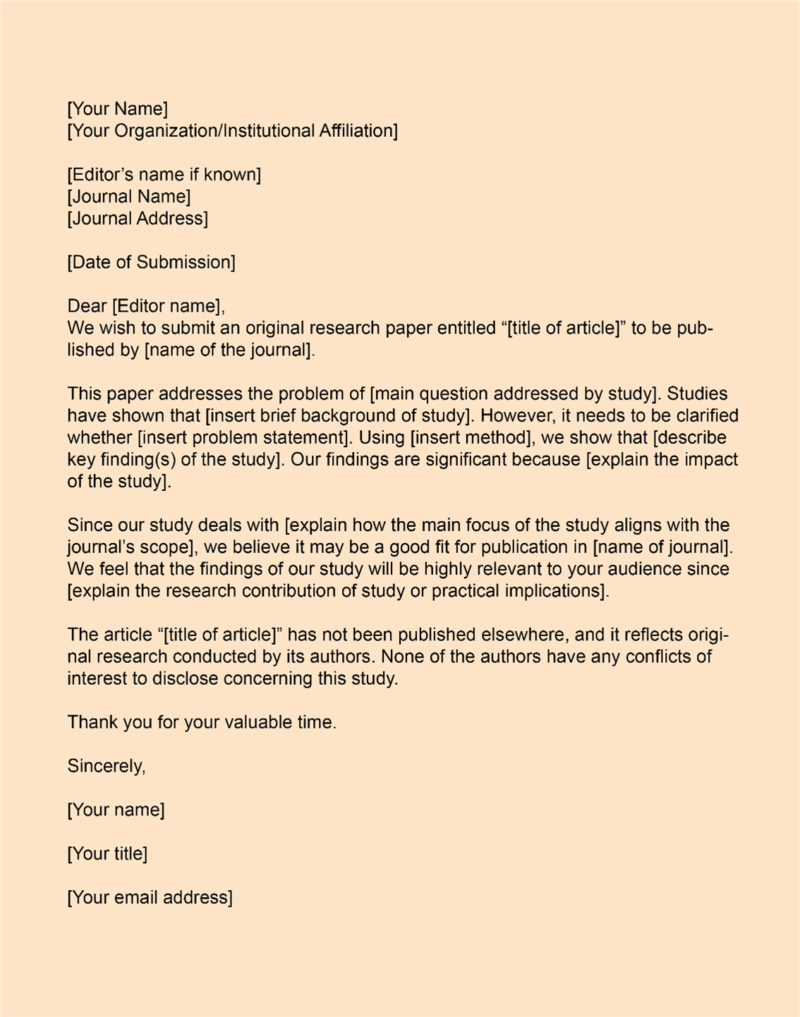
(This image is intended to demonstrate the norms of formatting and tone of expression in a cover letter, it is to be used only by the researcher as a reference in writing² .)
Conclusion
A strong cover letter can go a long way in ensuring success for researchers looking to publish their manuscripts! Your cover letter is the opening act, setting the stage for how editors perceive your manuscript. So, look at it not as just another formality but as a crucial opportunity to make a strong impression.
Understanding what to include, what is optional, and what is best left unsaid can be tricky. That is where our team of experts at Elsevier Language Services can step in. We will provide personalized recommendations and expert guidance to help you craft a cover letter that perfectly complements your manuscript. Reach out to us today to make a great first impression and embark on a successful academic journey!
Reference
- Nicholas, D. (2019). How to choose a journal and write a cover letter. Saudi Journal of Anaesthesia, 13(5), 35. https://doi.org/10.4103/sja.sja_691_18
- Loyola University Chicago. (n.d.). JCSHESA Sample Cover Letter. https://ecommons.luc.edu/jcshesa/cover_letter_template.pdf

Page-Turner Articles are More Than Just Good Arguments: Be Mindful of Tone and Structure!

Submission 101: What format should be used for academic papers?
You may also like.

Publishing Biomedical Research: What Rules Should You Follow?

Writing an Effective Cover Letter for Manuscript Resubmission

Journal Acceptance Rates: Everything You Need to Know

Research Data Storage and Retention

How to Find and Select Reviewers for Journal Articles

How to Request the Addition of an Extra Author Before Publication

Paper Rejection: Common Reasons

How to Write a Journal Article from a Thesis
Input your search keywords and press Enter.
How to write a cover letter for journal submission
Download our cover letter template.
When you submit your article to a journal, you often need to include a cover letter. This is a great opportunity to highlight to the journal editor what makes your research new and important. The cover letter should explain why your work is perfect for their journal and why it will be of interest to the journal’s readers.
When writing for publication, a well-written cover letter can help your paper reach the next stage of the manuscript submission process – being sent out for peer review . So it’s worth spending time thinking about how to write a cover letter to the journal editor, to make sure it’s going to be effective.
To help you, we’ve put together a guide to explain how to write a cover letter for journal article submission. You will receive cover letter instructions of what you should include and what you shouldn’t, and a word template cover letter.
Ready to submit?
Taylor & Francis Editing services has a high quality premium editing package to make you feel confident to submit.
Customized cover letter
Feedback on original writing
Complete language check
Extensive revisions.
What should my cover letter include?
Before you start to write, please check the instructions for authors (IFAs) of your chosen journal, as not all journals will require one. You should also check the IFAs for any journal specific information on what to include. This may include a list of relevant articles written by you or your co-authors that have been or are currently being considered for publication in other journals.
Key points to include in your letter to the editor:
Editor’s name (you can usually find this on the journal page on Taylor & Francis Online ).
Your manuscript’s title.
Name of the journal you are submitting to.
Statement that your paper has not been previously published and is not currently under consideration by another journal.
Brief description of the research you are reporting in your paper, why it is important, and why you think the readers of the journal would be interested in it.
Contact information for you and any co-authors .
Confirmation that you have no competing interests to disclose.
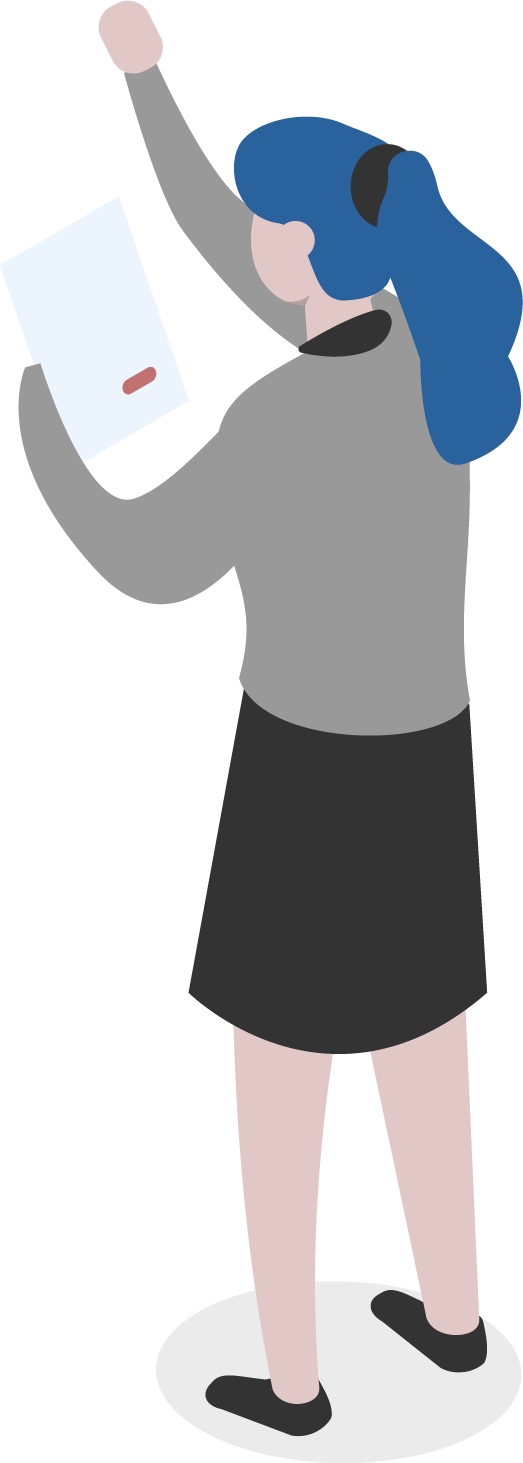
Things to avoid:
Don’t copy your abstract into your cover letter, instead explain in your own words the significance of the work, the problem that is being addressed, and why the manuscript belongs in the journal.
Don’t use too much jargon or too many acronyms, keep language straightforward and easy to read.
Avoid too much detail – keep your cover letter to a maximum of one page, as an introduction and brief overview.
Avoid any spelling and grammar errors and ensure your letter is thoroughly proofed before submitting.
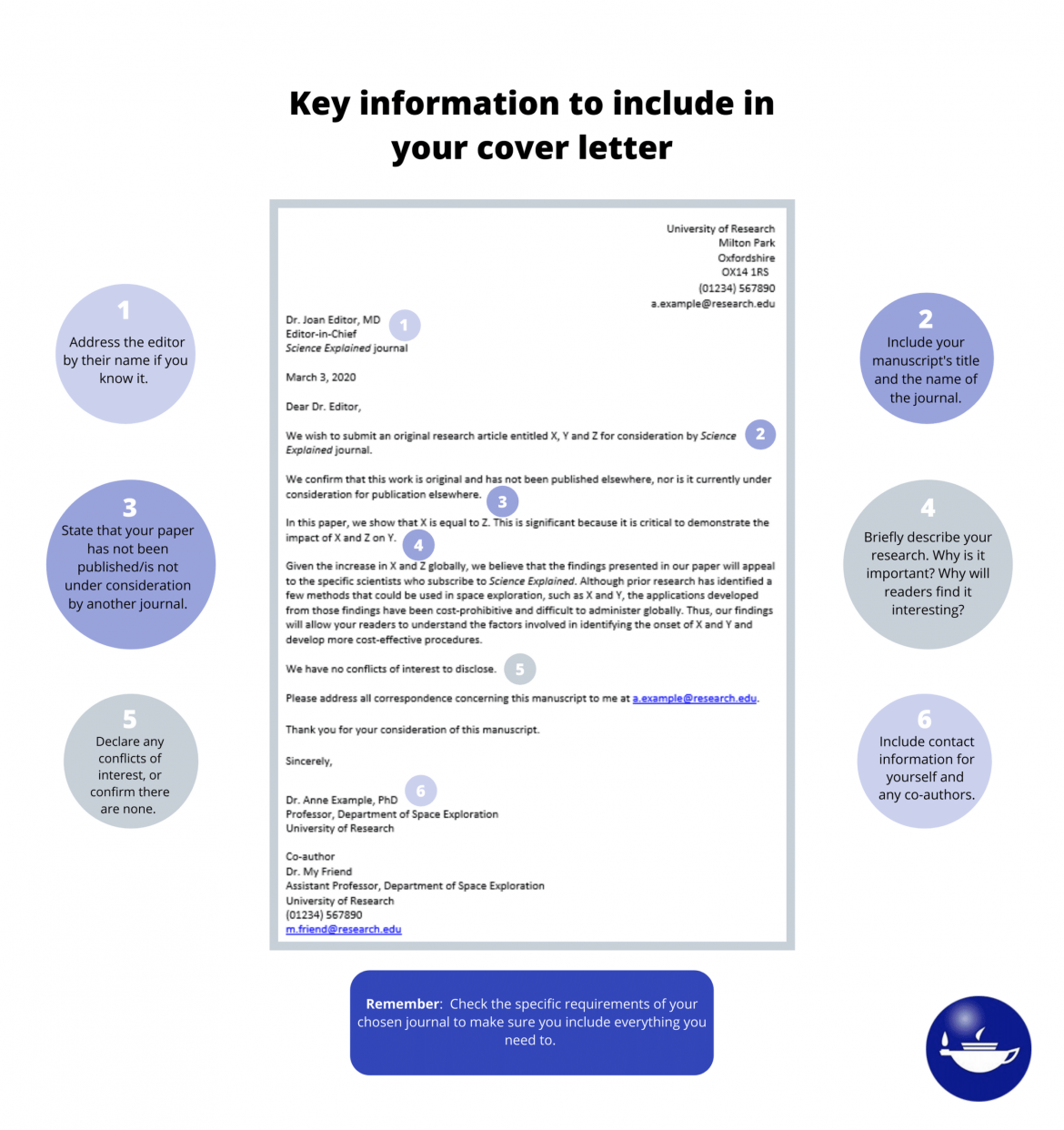
Click to enlarge your PDF on key information to include in your cover letter .
Cover letter template
If you need further help to write a cover letter for a journal, you can download and use our sample template as a guide.
You might find that the submission system for your chosen journal requires your cover letter to be submitted into a text box rather than as a separate document, but it is still a good idea to write a draft first to make sure you have included everything.
Always make sure to check the journal’s instructions for authors for any specific additional information to include.
Submission ready
Use our submission checklist to make sure you’ve included everything you need to.
If you need more guidance, take a look at our other information and resources to help you make your submission .

Rapid constructive feedback
Consider the Taylor & Francis Rapid Technical Review service to help you meet your deadline, through peer-review-like comments on your manuscript.
Related resources
Journal submission support
Guide to improve your submission experience
Article submission checklist
Publishing tips, direct to your inbox
Expert tips and guidance on getting published and maximizing the impact of your research. Register now for weekly insights direct to your inbox.
6 Research Analyst Cover Letter Examples
Introduction.
In today's highly competitive job market, it's essential to have a well-crafted cover letter that stands out to potential employers. This is especially true for research analysts, whose role requires strong analytical skills and attention to detail. A research analyst cover letter serves as an opportunity to showcase your qualifications, highlight your relevant experience, and demonstrate your passion for research and analysis.
A compelling cover letter can make a significant impact on your job application, setting you apart from other candidates and increasing your chances of securing an interview. In this article, we will provide you with examples of effective research analyst cover letters and discuss key takeaways from each example. By following these examples and implementing the key takeaways, you can create a strong cover letter that impresses hiring managers and enhances your job prospects as a research analyst.

Example 1: Market Research Analyst Cover Letter
Key takeaways.
Sarah's cover letter effectively showcases her experience and expertise in the market research field, making her a strong candidate for the Market Research Analyst position at Nielsen Holdings.
When applying for a market research role, it's important to highlight your experience in conducting primary and secondary research, analyzing data, and delivering actionable insights. This demonstrates your ability to generate valuable market intelligence for the company.
She emphasizes her progression in her career, starting as a Research Assistant and working her way up to a Senior Market Research Analyst. This shows her growth, development of skills, and ability to take on increasing levels of responsibility.
Highlighting career progression demonstrates your commitment to the field and your ability to excel in increasingly senior roles. It also suggests your potential for growth within the company.
Sarah also mentions her experience in managing teams and leading complex research projects. This showcases her leadership skills and ability to handle challenging assignments.
If you have experience leading teams or managing projects, be sure to highlight this in your cover letter. It demonstrates your ability to take initiative, collaborate effectively, and deliver results.
Overall, Sarah's cover letter effectively positions her as a qualified and experienced candidate for the Market Research Analyst position at Nielsen Holdings.
Example 2: Financial Research Analyst Cover Letter
Benjamin's cover letter effectively showcases his relevant experience and highlights his ability to deliver impactful results as a Financial Research Analyst.
When applying for a financial research analyst position, it is crucial to emphasize your experience and expertise in conducting thorough market research and analysis. This demonstrates your ability to provide valuable insights to support investment decisions.
By showcasing his achievements, Benjamin demonstrates his ability to drive innovation and improve efficiency in his previous roles.
Quantify the impact of your work by highlighting specific achievements and their measurable outcomes. This demonstrates your ability to deliver tangible results and adds credibility to your application.
Benjamin could further strengthen his cover letter by mentioning any specific industry certifications or technical skills that are relevant to the Financial Research Analyst role at J.P. Morgan.
If you possess any industry-specific certifications or technical skills, be sure to mention them in your cover letter. This highlights your specialized knowledge and enhances your suitability for the role.
Overall, Benjamin's cover letter effectively positions him as a highly qualified candidate for the Financial Research Analyst position at J.P. Morgan.
Example 3: Data Research Analyst Cover Letter
Emily's cover letter effectively showcases her experience and expertise as a Data Research Analyst, positioning her as an ideal candidate for the role at IBM.
When applying for a data research analyst position, it's essential to highlight your experience in data analysis, research, and the ability to derive actionable insights. This demonstrates your ability to contribute to data-driven decision-making within the organization.
She emphasizes her achievements in previous roles, such as implementing data cleaning processes that improved data accuracy and reliability by 20% at Microsoft and developing a predictive modeling framework that improved customer retention rates by 15% at Google.
Quantifying your achievements and showcasing the impact of your work is crucial in a data research analyst cover letter. It demonstrates your ability to drive tangible results and highlights your analytical skills.
Emily could further strengthen her cover letter by mentioning specific tools, programming languages, or statistical techniques she is proficient in, as this would further showcase her technical skills.
Don't forget to mention your proficiency in relevant programming languages (e.g., Python, R) and tools (e.g., SQL, Tableau) used in data analysis. This reinforces your technical expertise and makes you stand out as a strong candidate.
Example 4: Healthcare Research Analyst Cover Letter
Michael's cover letter effectively demonstrates his qualifications and experience as a Healthcare Research Analyst, positioning him as a strong candidate for the position at Mayo Clinic.
When applying for a healthcare research analyst role, it is crucial to showcase your experience and expertise in conducting research studies and analyzing complex healthcare data. This highlights your ability to contribute to the organization's research goals and drive advancements in medical knowledge.
He highlights his experience in conducting clinical research studies, analyzing data, and preparing reports for publication, showcasing his proficiency in the research process and data analysis.
Highlight your experience in conducting clinical trials, collecting and analyzing healthcare data, and presenting research findings. These skills are highly valuable in a healthcare research analyst role and demonstrate your ability to contribute to the organization's research projects.
Michael also emphasizes his role in leading research projects, overseeing the entire research process, and presenting findings to stakeholders, showcasing his project management and communication skills.
Mention your experience in project management, including your ability to design and implement research protocols, oversee data collection and analysis, and present findings to stakeholders. These skills are essential for success in a healthcare research analyst role.
To further strengthen his cover letter, Michael could include specific examples of his contributions or achievements in his previous roles.
Provide specific examples of your contributions or achievements in the healthcare research field, such as successful FDA approvals, significant publications, or impactful research projects. These examples highlight your ability to make meaningful contributions to the organization and demonstrate your expertise in the field.
Example 5: Social Research Analyst Cover Letter
Maria's cover letter effectively showcases her experience and passion for social research, positioning her as an ideal candidate for the Social Research Analyst position at the United Nations.
When applying for a research position, it is crucial to highlight your experience in conducting research and analysis in alignment with the organization's mission and goals. This demonstrates your ability to contribute meaningfully to their work.
Maria emphasizes her experience in working with international organizations such as the World Bank, International Monetary Fund, and United Nations Development Programme. This demonstrates her ability to navigate complex global issues and work collaboratively with diverse stakeholders.
Highlighting experience working with reputable international organizations can significantly strengthen your application, as it showcases your ability to work on a global scale and collaborate with experts in the field.
Maria also emphasizes her experience in conducting research on social inequalities, poverty reduction, and inclusive development, which aligns perfectly with the United Nations' commitment to the Sustainable Development Goals.
Tailor your cover letter to highlight your experience in specific areas that are relevant to the organization's goals. This demonstrates your understanding of their mission and your ability to contribute meaningfully to their work.
Overall, Maria's cover letter effectively showcases her qualifications, experience, and alignment with the United Nations' mission, making her a strong candidate for the Social Research Analyst position.
Example 6: Technology Research Analyst Cover Letter
Daniel's cover letter effectively showcases his experience and expertise as a Technology Research Analyst, positioning him as a strong candidate for the position at Microsoft.
When applying for a technology research role, it is important to highlight your experience in analyzing market trends, evaluating emerging technologies, and providing strategic recommendations. This demonstrates your ability to contribute to the company's innovation and growth.
He emphasizes his experience in conducting in-depth research on various industries and technologies, which showcases his ability to develop a deep understanding of the technology landscape and its impact on businesses.
Highlight your research skills and your ability to gather and analyze data to identify market opportunities and potential risks. This demonstrates your ability to provide valuable insights that inform strategic decision-making.
Daniel also mentions his experience in leading research projects focused on emerging technologies such as artificial intelligence and blockchain, which further establishes his expertise in the field.
Highlight your experience in leading research projects and your knowledge of cutting-edge technologies. This demonstrates your ability to stay up-to-date with the latest industry trends and your passion for technology innovation.
Overall, Daniel's cover letter effectively communicates his qualifications and passion for technology research, making him a strong candidate for the Technology Research Analyst position at Microsoft.
Skills To Highlight
As a research analyst, your cover letter should highlight the unique skills that make you a strong candidate for the role. These key skills include:
Data Analysis : As a research analyst, your ability to collect, analyze, and interpret data is essential. Highlight your proficiency in using statistical software such as SPSS, SAS, or R, as well as your experience with data visualization tools like Tableau or Power BI. Emphasize your ability to manipulate and analyze large datasets to derive meaningful insights.
Research Methodology : Research analysts need to be familiar with various research methodologies and techniques. Highlight your knowledge of quantitative and qualitative research methods, survey design, data collection techniques, and data validation. Discuss your experience in designing research studies, developing research questions, and conducting literature reviews.
Critical Thinking : Research analysts must possess strong critical thinking skills to evaluate information, identify patterns, and draw accurate conclusions. Showcase your ability to think critically by describing how you have approached complex research problems, identified potential biases or limitations in data, and developed innovative solutions.
Attention to Detail : In research analysis, attention to detail is crucial to ensure accurate and reliable results. Highlight your meticulousness in data collection, data entry, and data analysis processes. Discuss your experience in ensuring data quality, conducting data cleaning and validation, and maintaining data integrity throughout the research process.
Communication Skills : Effective communication is essential for research analysts to present their findings and recommendations to stakeholders. Showcase your ability to communicate complex research findings in a clear and concise manner, both orally and in writing. Highlight your experience in writing research reports, presenting research findings to clients or management, and collaborating with multidisciplinary teams.
Problem Solving : Research analysts need to be skilled problem solvers, able to identify and address research challenges effectively. Describe your experience in overcoming obstacles during research projects, adapting research methodologies to changing circumstances, and finding creative solutions to research problems.
Organizational Skills : Research analysts often work on multiple projects simultaneously, requiring excellent organizational skills. Highlight your ability to prioritize tasks, manage deadlines, and coordinate with team members to ensure the smooth execution of research projects. Discuss your experience in managing research databases, organizing research materials, and maintaining project documentation.
Subject Matter Expertise : Depending on the industry or field of research, research analysts may need specialized knowledge in a specific area. Highlight your subject matter expertise in relevant domains, such as market research, social sciences, healthcare, finance, or technology. Discuss any certifications, advanced degrees, or industry-specific training that demonstrate your expertise.
By highlighting these skills in your cover letter, you will demonstrate to potential employers that you have the necessary qualifications and capabilities to excel as a research analyst.
Common Mistakes To Avoid In Cover Letters
When crafting your cover letter for a research analyst position, it's important to avoid these common mistakes:
Using Generic Language : One of the biggest mistakes you can make is using generic language that could apply to any job or company. Your cover letter should be tailored specifically to the research analyst role and the company you're applying to. Avoid using clichés or buzzwords that don't add any value to your application. Instead, focus on highlighting your unique skills and experiences that make you a strong candidate for the position.
Failing to Demonstrate Research Experience : As a research analyst, employers will be looking for evidence of your research skills and experience. It's important to showcase your ability to gather, analyze, and interpret data in a clear and concise manner. Avoid simply stating that you have research experience without providing specific examples or accomplishments. Instead, provide concrete examples of research projects you have worked on, the methodologies you used, and the insights you gained from your findings.
Not Highlighting How Your Expertise Can Contribute to Company Goals : Your cover letter should not only demonstrate your qualifications for the research analyst role, but also show how your expertise can contribute to the company's goals and objectives. Research analysts play a crucial role in helping companies make informed decisions based on data and insights. Highlight how your research skills, analytical thinking, and attention to detail can add value to the company's research efforts and contribute to its overall success.
Neglecting to Address Potential Gaps in Experience or Skills : If you have any gaps in your experience or skills that may be relevant to the research analyst role, it's important to address them in your cover letter. Don't leave the hiring manager guessing or assuming the worst. Instead, take the opportunity to explain any gaps and emphasize how you have taken steps to bridge those gaps or acquire the necessary skills. This shows your proactiveness and commitment to professional growth.
Failing to Proofread and Edit : A cover letter riddled with spelling and grammar errors reflects poorly on your attention to detail and communication skills. Before submitting your application, make sure to thoroughly proofread and edit your cover letter. Use spell-checking tools and have someone else read it to catch any mistakes you may have missed. A polished and error-free cover letter will leave a positive impression on the hiring manager and increase your chances of getting an interview.
Avoiding these common mistakes will help you craft a strong and compelling cover letter that highlights your qualifications and makes you stand out as a research analyst candidate. Take the time to tailor your cover letter to the specific role and company, and showcase your research experience, skills, and enthusiasm for the position.
In conclusion, a well-crafted cover letter is an essential tool for research analysts looking to secure a position in a competitive job market. By following the examples provided in this article, you can learn how to effectively showcase your skills and experience in a way that will make you stand out from other applicants.
The key takeaways from these examples include the importance of highlighting your relevant qualifications, such as your educational background and any certifications or training you have received. Additionally, it is crucial to demonstrate your ability to analyze data, conduct research, and communicate your findings effectively.
Avoid common mistakes such as using generic language or not tailoring your cover letter to the specific job you are applying for. Instead, personalize your letter by mentioning the company by name and explaining why you are interested in the position.
By following these guidelines, you can create a strong and compelling cover letter that will impress hiring managers and increase your chances of landing a research analyst position. Take the time to carefully craft each cover letter to ensure it is tailored to the specific job you are applying for, and remember to proofread for any errors or typos before submitting your application.
With these cover letter examples and tips in mind, you are well-equipped to create an impactful cover letter that will help you stand out in the competitive research analyst job market. Good luck with your job search!

Research Paper Cover Letter
Cover letter maker.
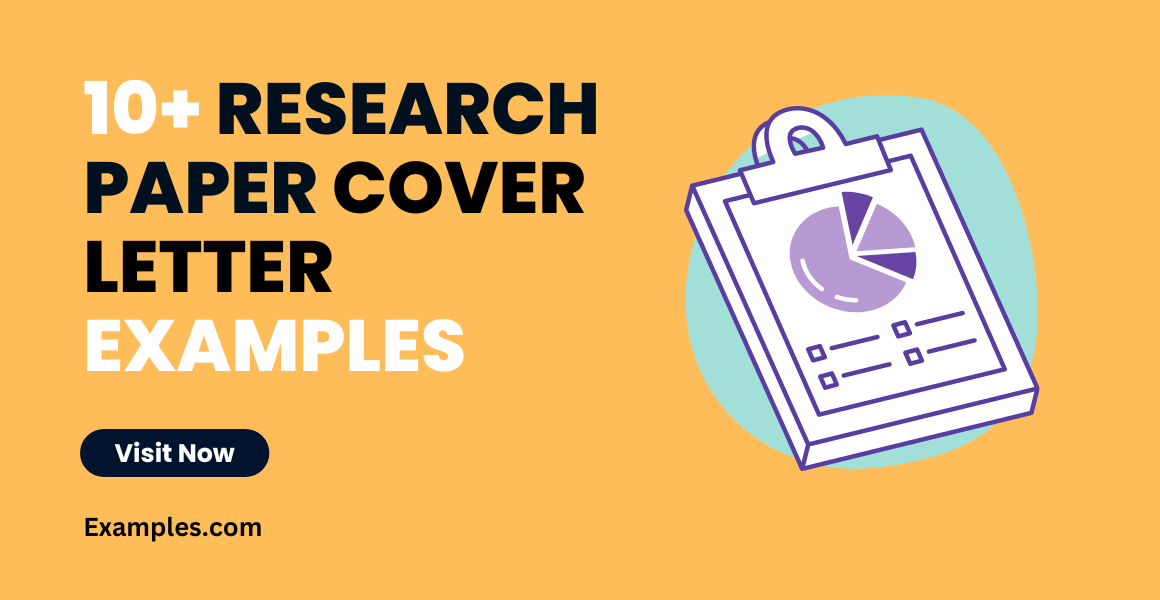
A research paper cover letter is more than just an introductory note; it’s a vital aspect of your submission to academic journals. This document provides the initial impression and encapsulates the essence of your research. In this article, we will delve into what a research paper cover letter is, provide an illustrative example, and share valuable tips for crafting one that resonates with the editors.
What is a Research Paper Cover Letter?
A research paper cover letter is a formal letter accompanying the submission of a research paper to a journal or academic conference. It’s your opportunity to introduce the paper, briefly summarize the findings, highlight the significance, and persuade the editor or review panel about the paper’s importance. It’s a critical aspect of the submission process, reflecting the paper’s quality and your professionalism, so it must be thoughtfully composed.
What is an Example of a Research Paper Cover Letter?
Here is a comprehensive example of a research paper cover letter:
[Your Name] [Your Address] [City, State ZIP Code] [Email Address] [Phone Number] [Date]
[Editor’s Name] [Title] [Journal Name] [Address] [City, State ZIP Code]
Subject: Submission of Manuscript – “Exploring the Impact of AI on Environmental Sustainability”
Dear [Editor’s Name],
I am honored to submit my manuscript entitled “Exploring the Impact of AI on Environmental Sustainability” for consideration for publication in [Journal Name]. This research offers groundbreaking insights into how artificial intelligence can be harnessed for sustainable development.
The methodology includes comprehensive analysis and experimentation, and the results reveal promising opportunities in utilizing AI for ecological balance. The findings contribute to the broader understanding of technology’s role in environmental stewardship, filling a significant gap in existing literature.
I confirm that this work is original, has not been published elsewhere, and complies with all ethical guidelines. Enclosed are the manuscript, diagrams, tables, and supplementary materials as per your submission criteria.
I appreciate your consideration of this submission and eagerly await the opportunity to contribute to [Journal Name]. Please feel free to contact me for any further information.
[Your Signature]
[Your Typed Name] [Your Affiliation]
This great cover letter example articulates the crucial elements that make up an effective research paper cover letter. It introduces the topic, succinctly outlines the key points, and concludes with a respectful closure. Customizing such a letter according to the specific journal or conference’s guidelines is essential for a successful submission.
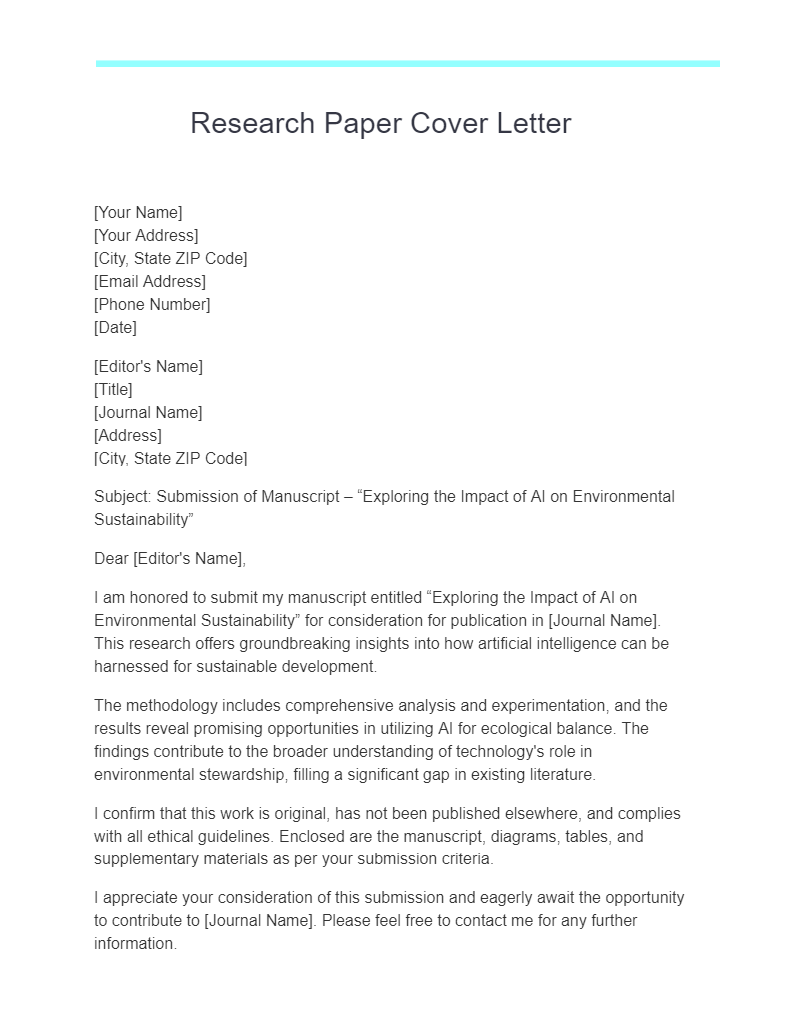
Size: 28 KB
Research Paper Cover Letter Format
Navigate the nuances of academic presentation with our Research Paper Cover Letter Format, designed to make your scholarly work stand out with professionalism and clarity.
[Your Name] [Address] [City, State ZIP Code] [Email Address] [Date]
[Editor’s Name] [Title] [Journal Name] [Address] [City, State ZIP Code]
Subject: Submission of Manuscript: “[Title of the Research Paper]”
I am pleased to submit my manuscript entitled “[Title of the Research Paper]” for potential publication in [Journal Name]. The research embodied in this paper investigates [provide a brief but comprehensive overview of the research topic, methodology, and significance].
This manuscript has not been published elsewhere and has not been submitted simultaneously for publication elsewhere. I believe that the insights and evidence presented in this paper provide a valuable contribution to the existing body of work in [specify the field or subject area].
Thank you for considering my submission. I look forward to hearing from you soon.
Sincerely, [Your Name] [Your Title] [Your Phone Number] [Your Affiliation]
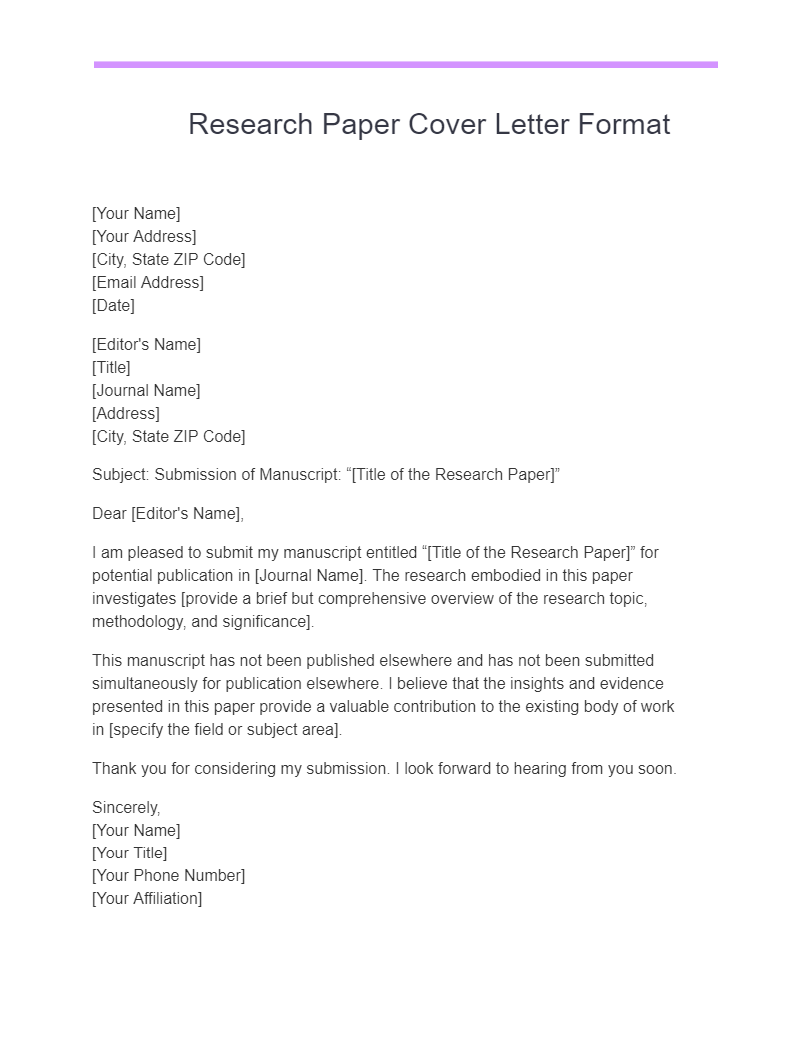
Size: 27 KB
Sample Research Paper Cover Letter Example
Access our comprehensive Sample Research Paper Cover Letter to guide your submissions, ensuring they align with academic expectations and standards.
[Your Full Name] [Your Address] [City, State, ZIP Code] [Phone Number] [Email Address] [Date]
[Professor’s Full Name] [Title] [Department] [University Name] [Address] [City, State, ZIP Code]
Subject: Submission of Research Paper on [Title]
Dear Professor [Last Name],
I am honored to submit my research paper titled “[Title of the Research Paper]” for evaluation. This paper, a key part of my [Degree Name], provides an in-depth analysis of [briefly explain the subject matter, highlighting the key themes, questions, and methodology].
Under your guidance and supervision, I have meticulously crafted this paper to reflect the highest standards of academic rigor. I am grateful for the insights and feedback you have provided throughout this process.
I look forward to your review and comments, and I am available for a meeting to discuss the paper at your convenience.
Thank you for your time and consideration.
Best Regards, [Your Full Name] [Your Student ID]
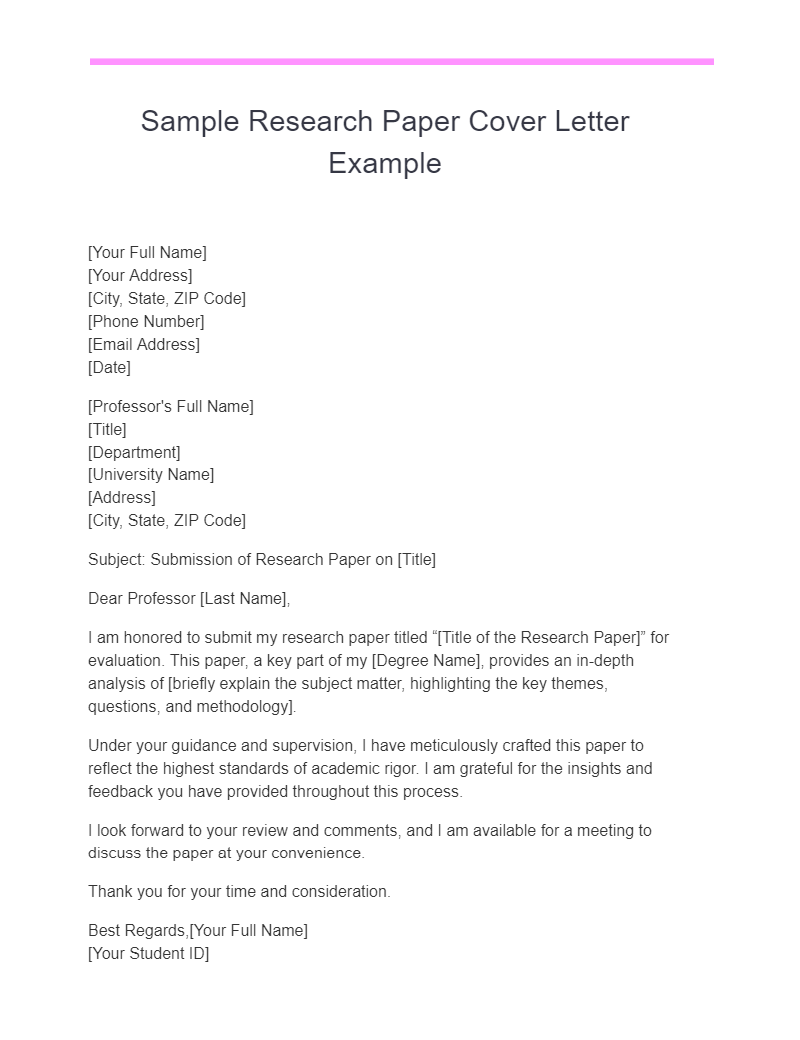
APA Style Research Paper Cover Letter Example
Master the intricacies of the APA format with our specialized cover letter, crafted to showcase your research while adhering to this authoritative style guide.
[Author’s Full Name] [Author’s Affiliation] [City, State] [Phone Number] [Email Address] [Date]
[Editor’s Name] [Title] [Journal’s Name] [Address] [City, State ZIP Code]
Subject: Submission of APA Style Research Paper: “[Title of the Paper]”
I am writing to submit my research paper for consideration in the [Journal’s Name]. The paper, titled “[Title of the Paper],” strictly adheres to the APA citation style and presents a methodological approach to [explain the central theme of the paper].
The enclosed manuscript highlights the [mention key findings, implications, or innovations]. I believe it will resonate well with the readers of [Journal’s Name] and contribute to the ongoing scholarly discourse in the field of [Field of Study].
Please find attached the manuscript along with all supplementary materials. I appreciate your consideration and await your feedback.
Sincerely, [Author’s Full Name] [Author’s Title] [Author’s Affiliation]
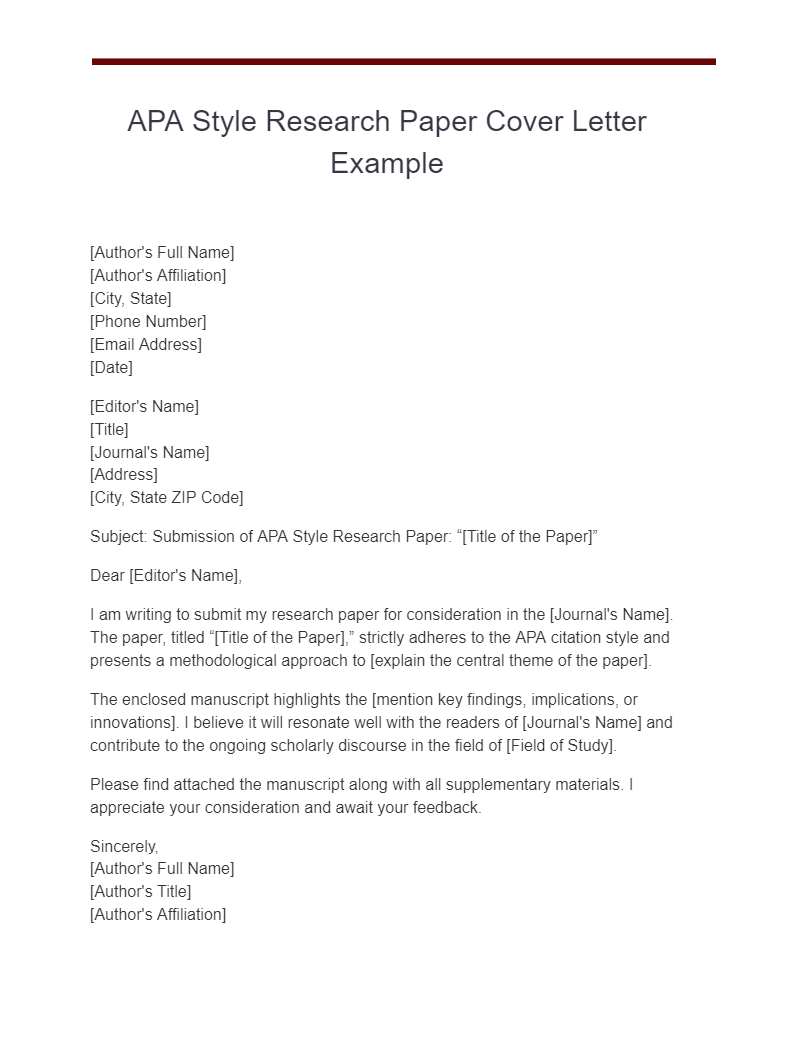
Size: 26 KB
Cover Letter for Research Project Example
Elevate your project proposals with our tailored cover letter, emphasizing the significance, methodology, and expected outcomes of your academic research.
[Your Name] [Address] [City, State ZIP Code] [Email Address] [Phone Number] [Date]
[Project Coordinator’s Name] [Title] [Organization Name] [Address] [City, State ZIP Code]
Subject: Application for [Project Title] Research Project
Dear [Project Coordinator’s Name],
I am writing to express my keen interest in the [Project Title] research project at [Organization Name]. With a strong background in [Your Field], I believe that my skills and experiences align perfectly with the project’s objectives.
I have attached my research proposal, CV, and other relevant documents for your review. My proposal outlines my approach to [briefly summarize the main focus of the research project].
Thank you for considering my application. I am eager to contribute my expertise to this exciting project and look forward to the opportunity to discuss my proposal further.
Yours sincerely, [Your Name] [Your Title] [Your Affiliation]
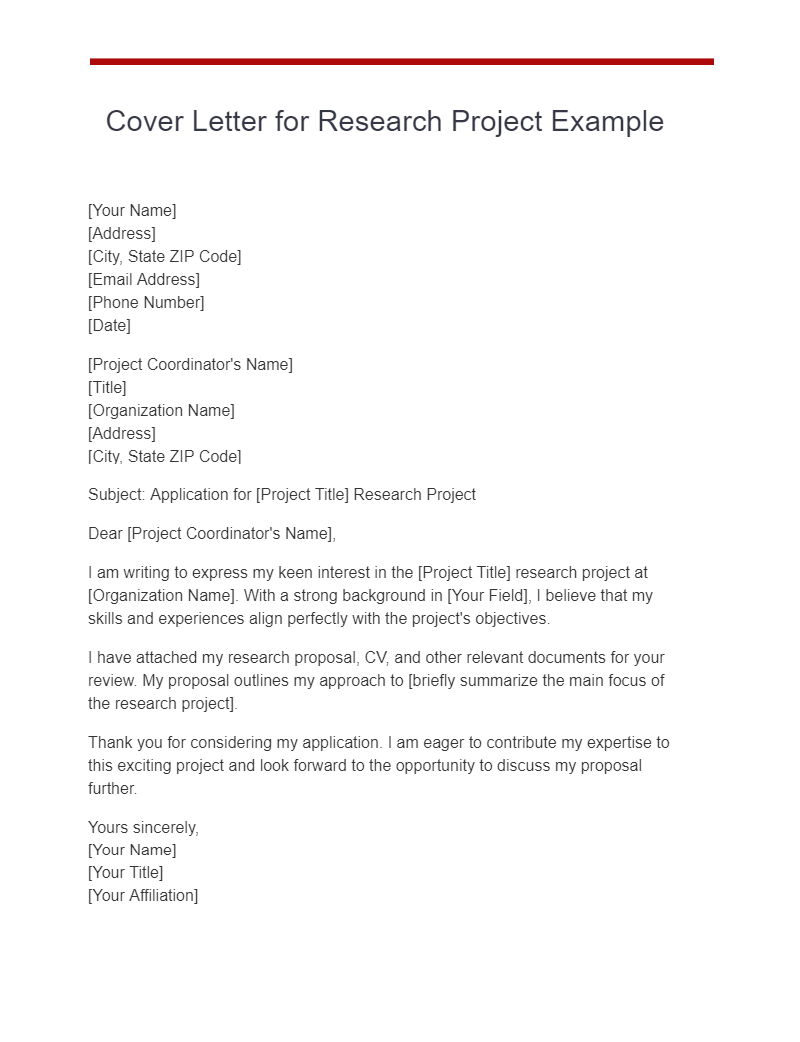
Research Paper Cover Letter for Student Example
Enhance your academic submissions with our student-focused cover letter, designed to highlight your research diligence, hypotheses, and learning objectives.
[Student’s Full Name] [Address] [City, State ZIP Code] [Email Address] [Date]
[Professor’s Full Name] [Title] [Department] [University Name] [Address] [City, State ZIP Code]
Subject: Submission of Research Paper on [Topic]
I am thrilled to submit my research paper on [Topic] as part of the requirements for [Course Name]. Through rigorous analysis, innovative methodologies, and critical thinking, I have explored [briefly summarize the subject matter of the paper].
I value the insights and guidance you provided during my research and writing process. The knowledge I gained from this experience has greatly enhanced my understanding of [Field of Study].
Thank you for your time and consideration. I look forward to your feedback.
Sincerely, [Student’s Full Name] [Student ID] [Course Name]
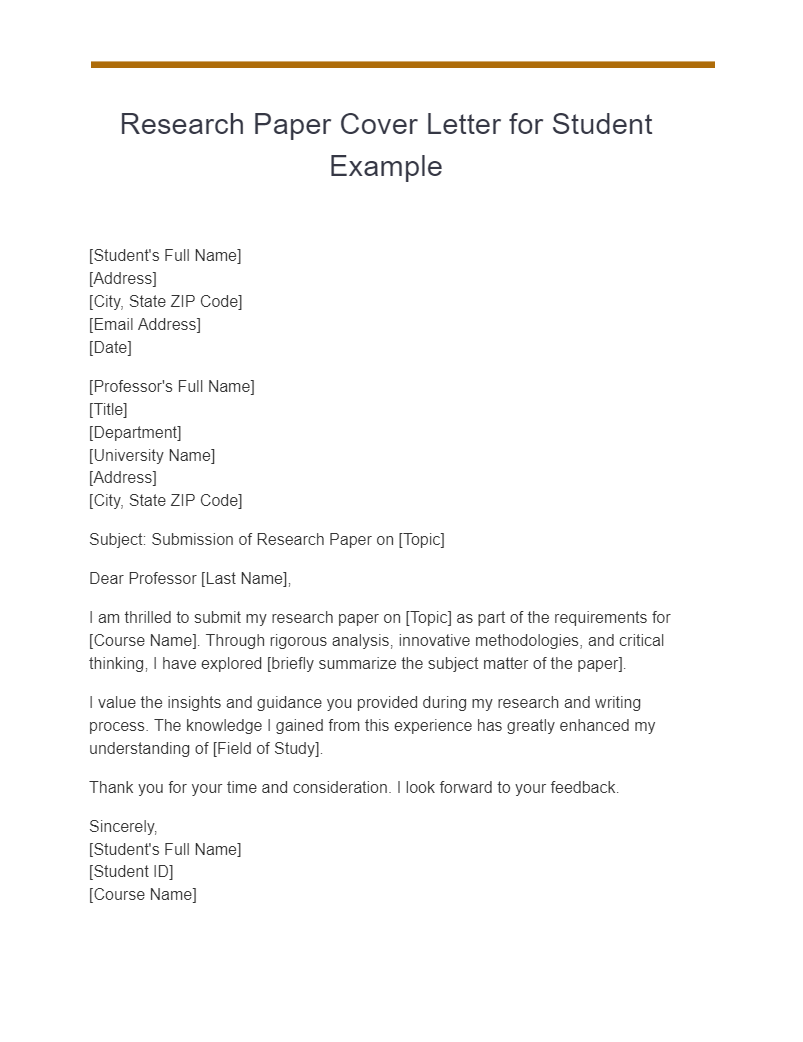
Research Paper Cover Letter for Thesis Example
Add finesse to your thesis presentation with our dedicated cover letter, underlining the depth, originality, and significance of your pivotal research.
[Your Full Name] [Address] [City, State ZIP Code] [Phone Number] [Email Address] [Date]
[Thesis Advisor’s Full Name] [Title] [Department] [University Name] [Address] [City, State ZIP Code]
Subject: Submission of Thesis Research Paper on [Topic]
Dear Dr. [Last Name],
It is with great anticipation that I submit my thesis research paper on [Topic]. This comprehensive study, guided by your expert mentorship, has been both challenging and rewarding.
I have delved deeply into [explain the central theme, methodology, and findings], aiming to contribute valuable insights to the field of [Field of Study].
Enclosed are my thesis, along with all supporting documents. I appreciate your attention to this work, and I am eager to discuss it further at your convenience.
Thank you for your time, support, and guidance.
Best Regards, [Your Full Name] [Your Student ID] [Degree Program]
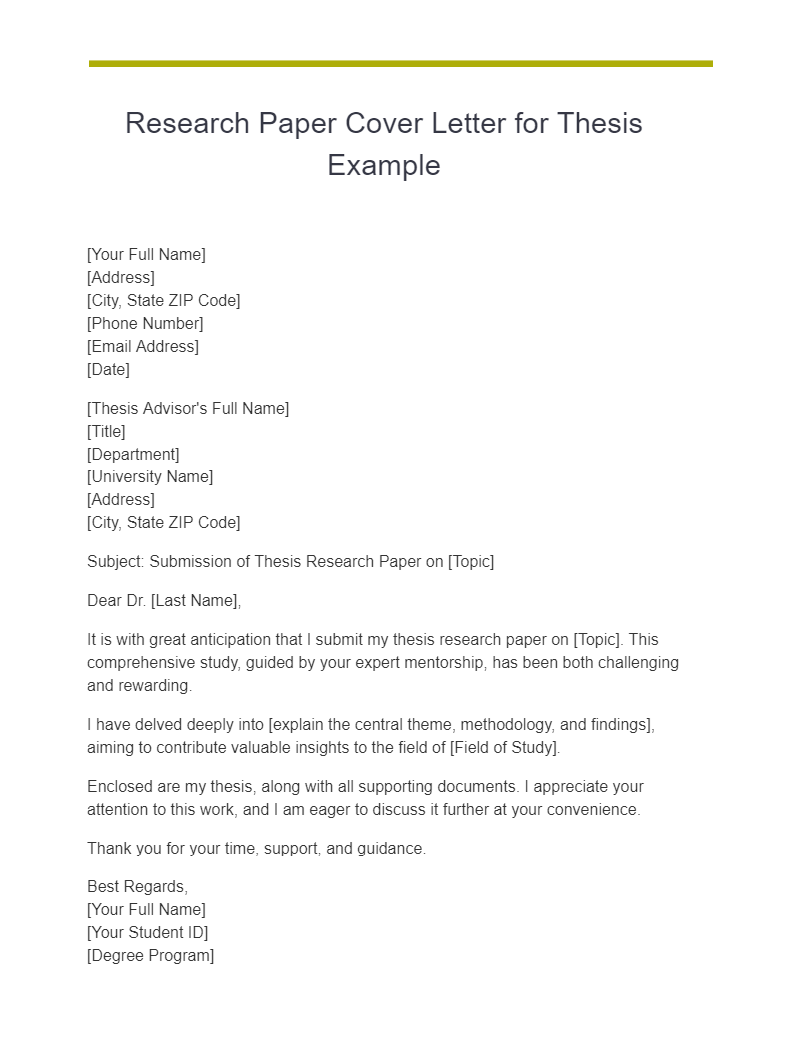
Cover Letter for Journal Submission Example
Ensure your scholarly work is compellingly presented with our Journal Submission Cover Letter, tailored to captivate editors and facilitate publication.
[Your Full Name] [Title] [Address] [City, State ZIP Code] [Email Address] [Phone Number] [Date]
[Editor’s Full Name] [Title] [Journal Name] [Address] [City, State ZIP Code]
Subject: Manuscript Submission for [Journal Name]: “[Title of Research Paper]”
Dear Dr. [Editor’s Last Name],
I am pleased to submit my manuscript, titled “[Title of Research Paper],” for potential publication in [Journal Name]. This original research contributes to the field of [Field of Study] by [provide a concise overview of the paper’s central theme, methodology, and key findings].
I have followed all the guidelines provided by [Journal Name] and have included all necessary supplementary materials.
Thank you for considering my submission. I believe this research fits well with the focus of your esteemed journal, and I look forward to your response.
Sincerely, [Your Full Name] [Your Title] [Your Affiliation]
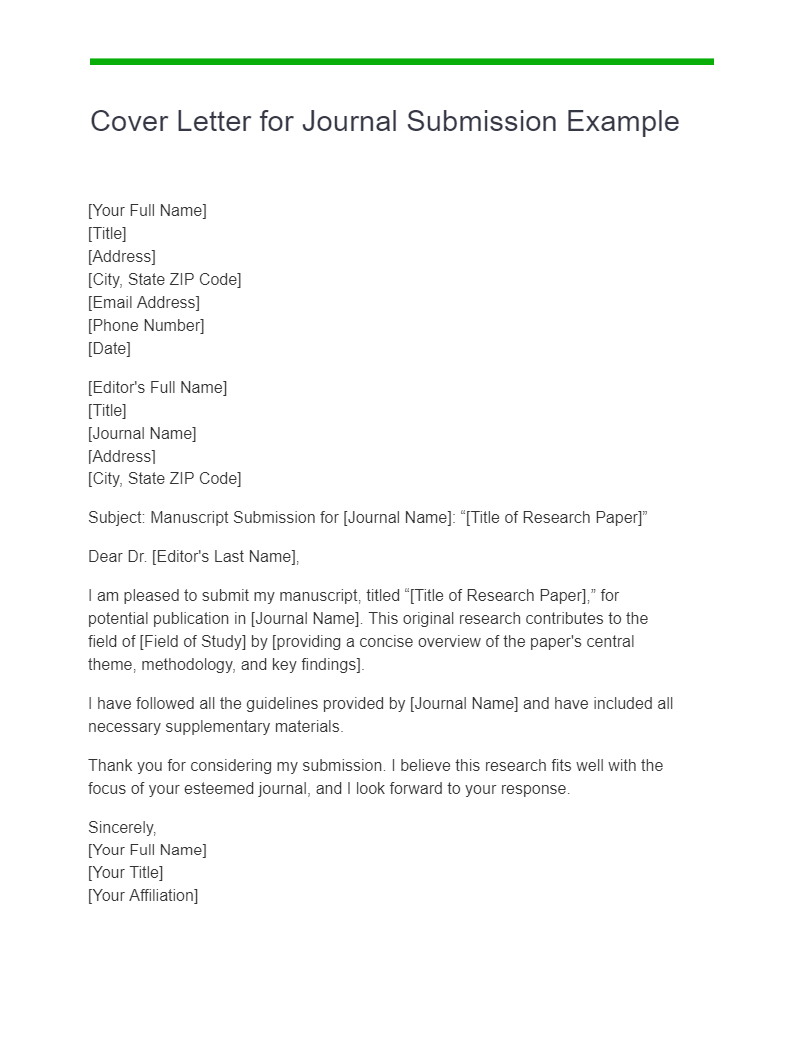
Simple Research Paper Cover Letter Example
Go for a minimalist yet impactful approach with our Simple Research Paper Cover Letter, designed to present your findings clearly and concisely.
[Recipient’s Full Name] [Title] [Organization Name] [Address] [City, State ZIP Code]
Subject: Submission of Research Paper: “[Title]”
Dear [Recipient’s First Name],
I am delighted to submit my research paper on [Title]. This paper, written as part of my [Degree/Course], provides a comprehensive analysis of [briefly summarize the research topic and methodology].
I have enclosed the paper and all necessary supporting documents. Your review and feedback will be greatly appreciated.
Best Regards, [Your Full Name] [Your Title] [Your Affiliation]
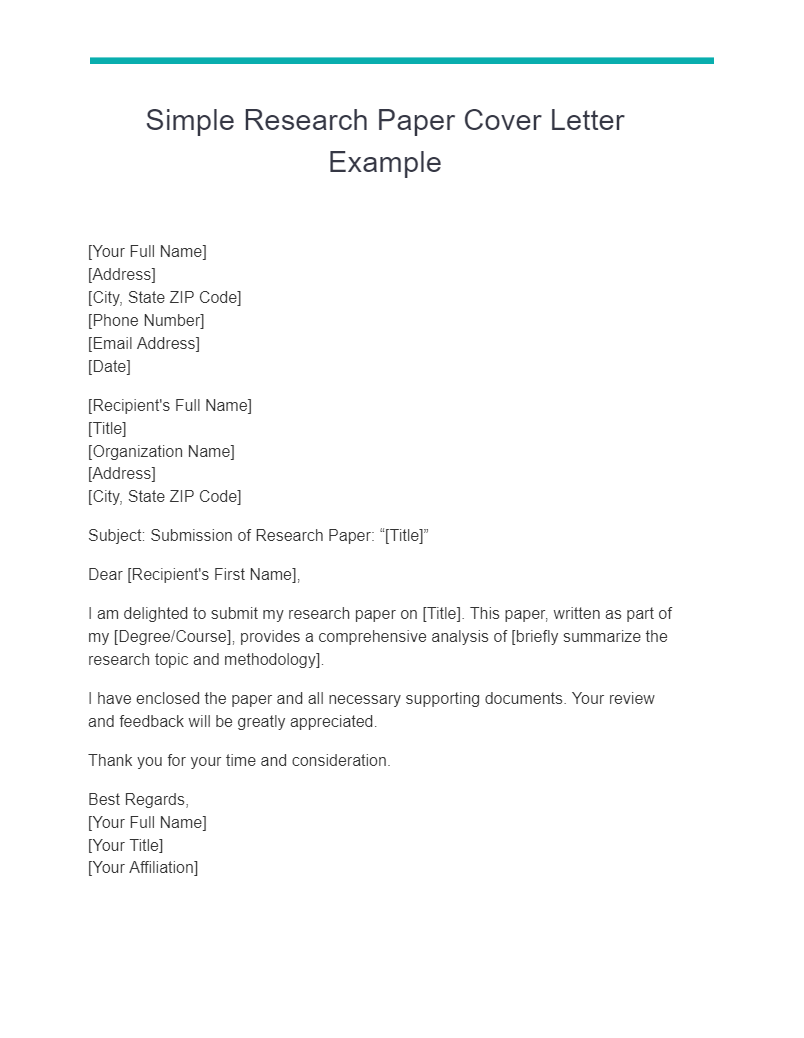
Basic Research Paper Cover Letter Example
Use our Basic Research Paper Cover Letter as a foundational guide, offering a straightforward presentation of your academic research and its implications.
[Your Full Name] [Address] [City, State ZIP Code] [Email Address] [Date]
Subject: Manuscript Submission: “[Title]”
I am submitting my manuscript titled “[Title]” for your review. This research paper delves into [briefly describe the research topic, key questions, methodology, and significance].
Enclosed are the manuscript and all necessary supporting documents. I look forward to your feedback and hope for a positive consideration.
Thank you for your time.
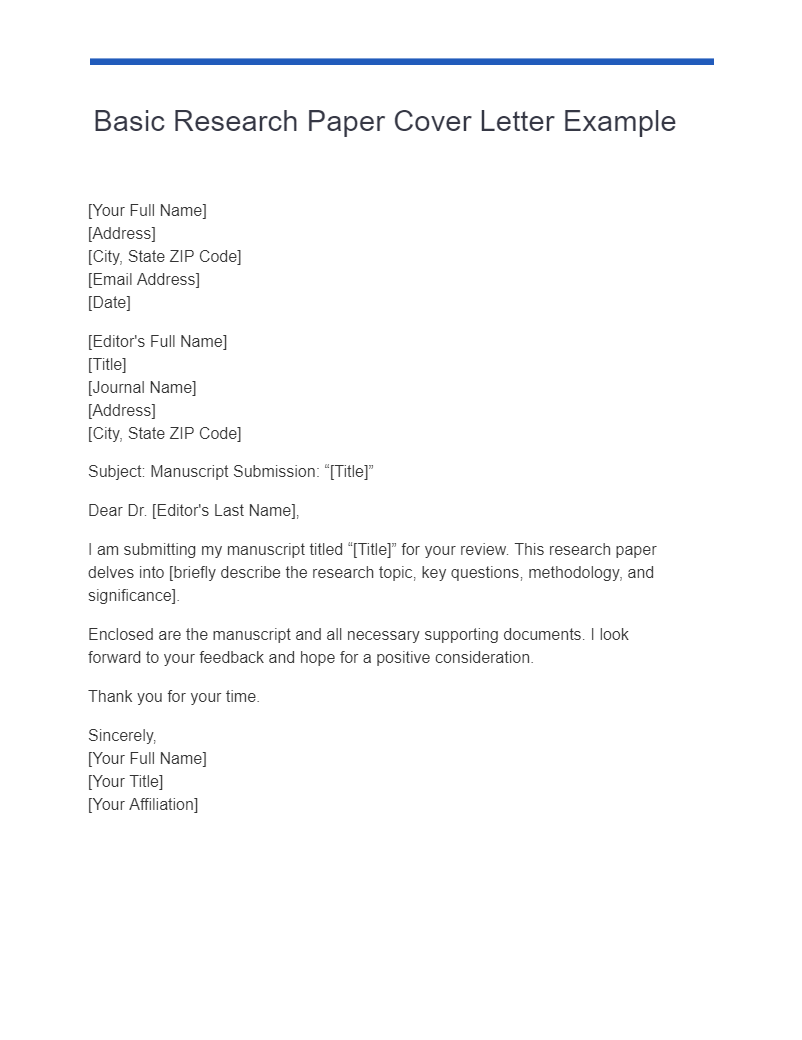
Professional Research Paper Cover Letter Example
Elevate your academic submissions with a touch of professionalism using our expertly crafted cover letter, emphasizing your research’s significance, methodology, and scholarly contribution.
Subject: Professional Submission of Research Paper: “[Research Paper Title]”
I am pleased to submit my research paper, titled “[Research Paper Title],” for professional review and potential publication in [Journal Name]. This work represents a rigorous investigation into [provide a detailed overview of the research subject, methodology, key findings, and implications].
I believe this research paper meets the high standards of your esteemed journal and will engage and inform your readership.
Please find attached the manuscript, along with all necessary supporting documents. I look forward to your review and response.
Yours Professionally, [Your Full Name] [Your Title] [Your Affiliation] [Your Phone Number]
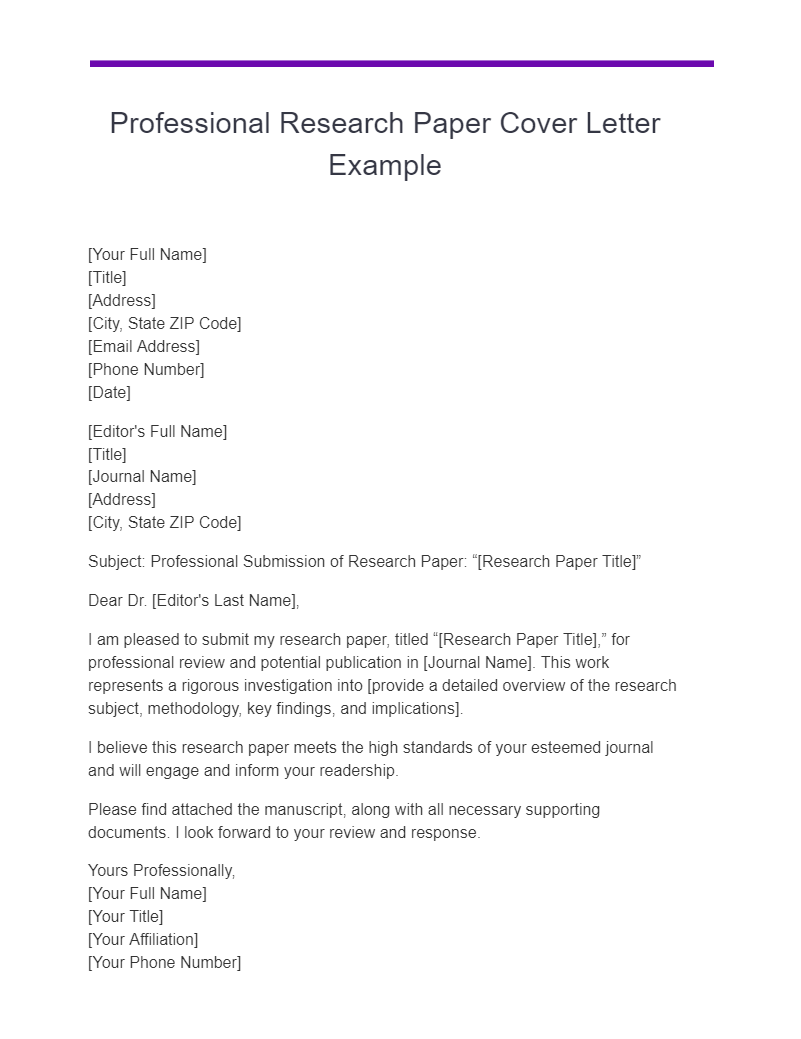
What do you write in a Research Paper Cover Letter?
A Research Paper Cover Letter serves as a formal introduction of your research to the editor, professor, or other relevant authority. It highlights key aspects of your research and reflects your professionalism. Here’s what you typically include:
1. Introduction: Introduce yourself, the title of the paper, and the purpose of the cover letter. 2. Subject of Research: Briefly explain the research topic, methodology, and main findings. 3. Relevance: Discuss the significance of your research and why it is suitable for the intended audience or journal. 4. Compliance with Guidelines: Mention adherence to the submission guidelines or specific style, like APA. 5. Exclusivity: If submitting to a journal, state that the work has not been published elsewhere. 6. Attachments: List the documents you are attaching, including the manuscript and supplementary materials. 7. Gratitude and Closing: Thank the recipient for their consideration and provide your contact information.
How Do You Write a Cover Letter for a Research Paper?
Writing a cover letter for a research paper requires care and precision. Here’s a step-by-step guide:
1. Address the Recipient Formally: Use the proper title and full name if known. If not, use a general salutation. 2. Introduce Yourself and Your Paper: Start with a concise introduction to your research and its relevance. 3. Provide a Brief Overview: Summarize the key points, methodology, and findings of your research. 4. Highlight the Significance: Explain why the paper is important and how it contributes to the field. 5. Follow Guidelines: If submitting to a journal or specific conference, adhere to their guidelines and mention your compliance. 6. Use Professional Tone and Language: Keep the language formal, clear, and error-free. 7. Include Contact Information: Provide your email, phone number, and other relevant contact details. 8. Sign Off Formally: Close with a polite and professional sign-off, such as “Sincerely,” followed by your name.
Tips for Writing a Research Paper Cover Letter
1. Understand Your Audience: Tailor the cover letter to the recipient, whether it’s a journal editor, professor, or other authority. 2. Be Concise: Keep it brief while including all necessary details. 3. Highlight Key Points: Focus on the most critical and unique aspects of your research. 4. Follow a Structure: Use a clear and organized format with distinct sections. 5. Proofread: Ensure that your cover letter is free of grammatical errors and typos. 6. Maintain Professionalism: Use a respectful tone and formal language throughout. 7. Align with the Journal or Institution’s Tone: If applicable, match the style and tone of the journal or institution to which you are submitting.
Research Paper Cover Letters play a crucial role in making a positive impression and conveying the significance of your work. By adhering to formalities and focusing on the essentials of your research, you can create an effective and professional cover letter.
Text prompt
- Instructive
- Professional
Write a cover letter for a college student applying for an internship at an educational technology company
Form a cover letter for a high school student seeking a part-time job at a local bookstore.
11 Professional Research Assistant Cover Letter Examples for 2024
Your research assistant cover letter should immediately highlight your keen attention to detail. This quality is non-negotiable for success in compiling and analyzing data efficiently. Consistently demonstrate your ability to support complex research projects with precision. Your cover letter must reflect a proactive approach and a solid understanding of the research process.
All cover letter examples in this guide
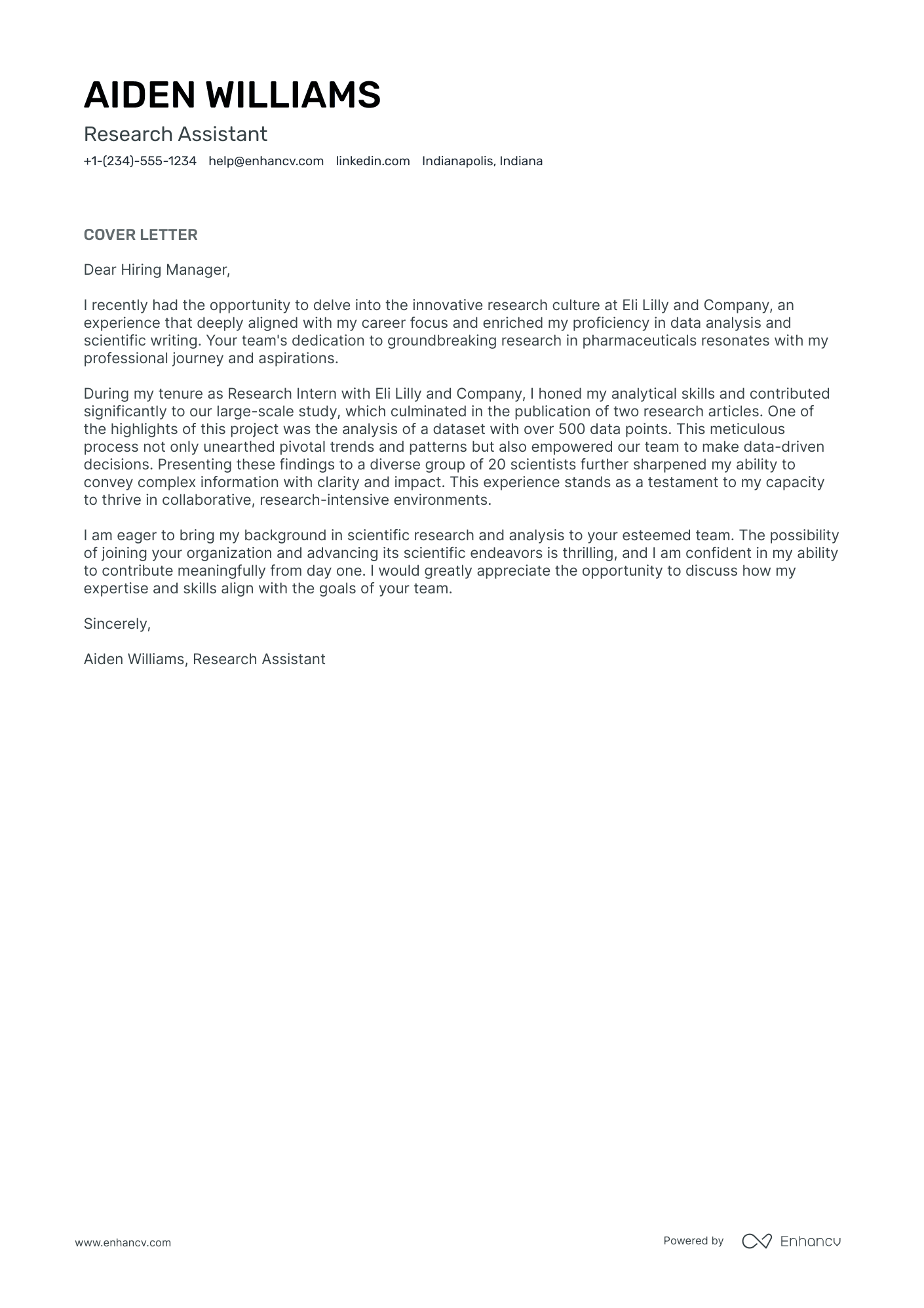
Entry-Level Research Assistant
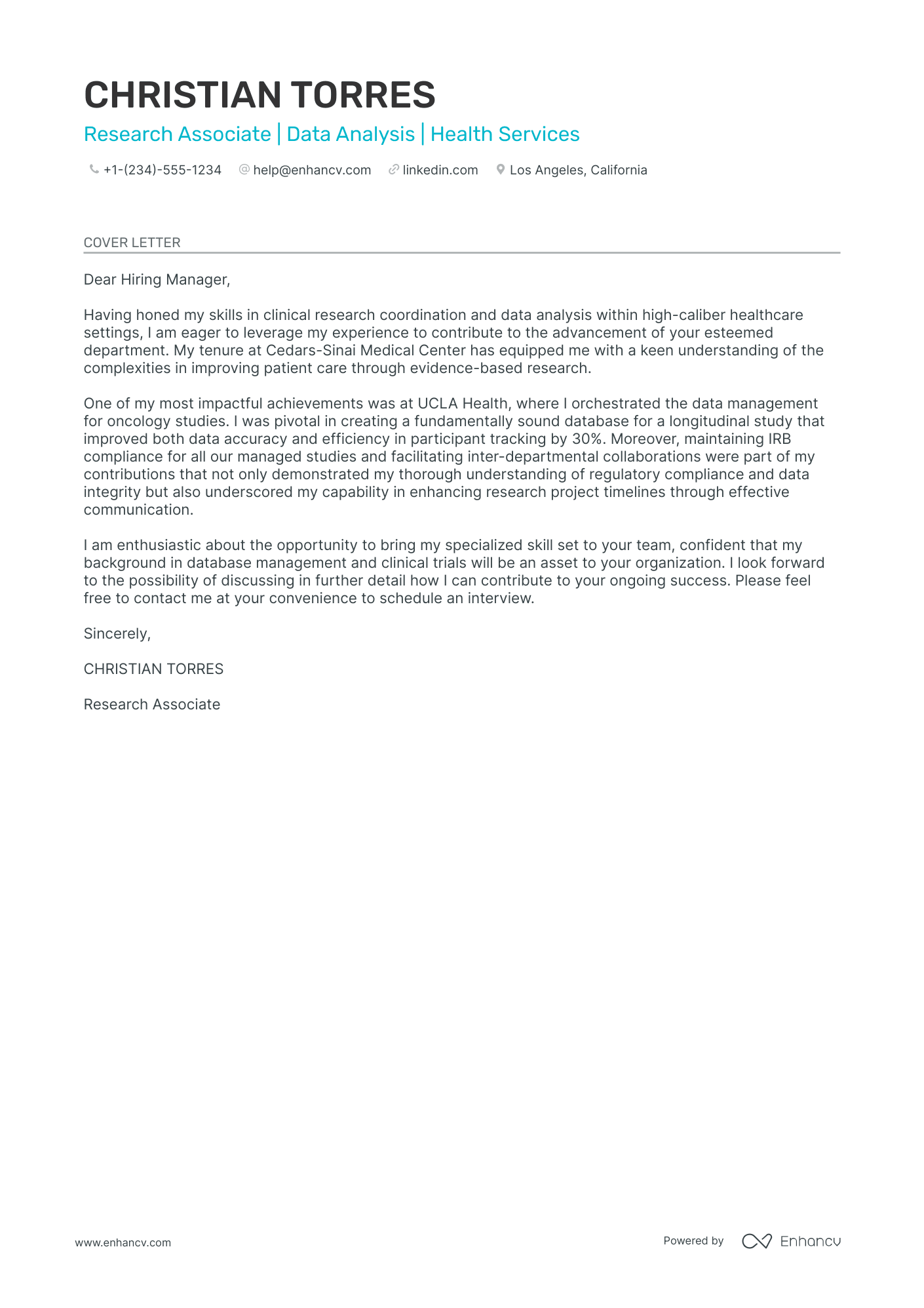
Research Associate
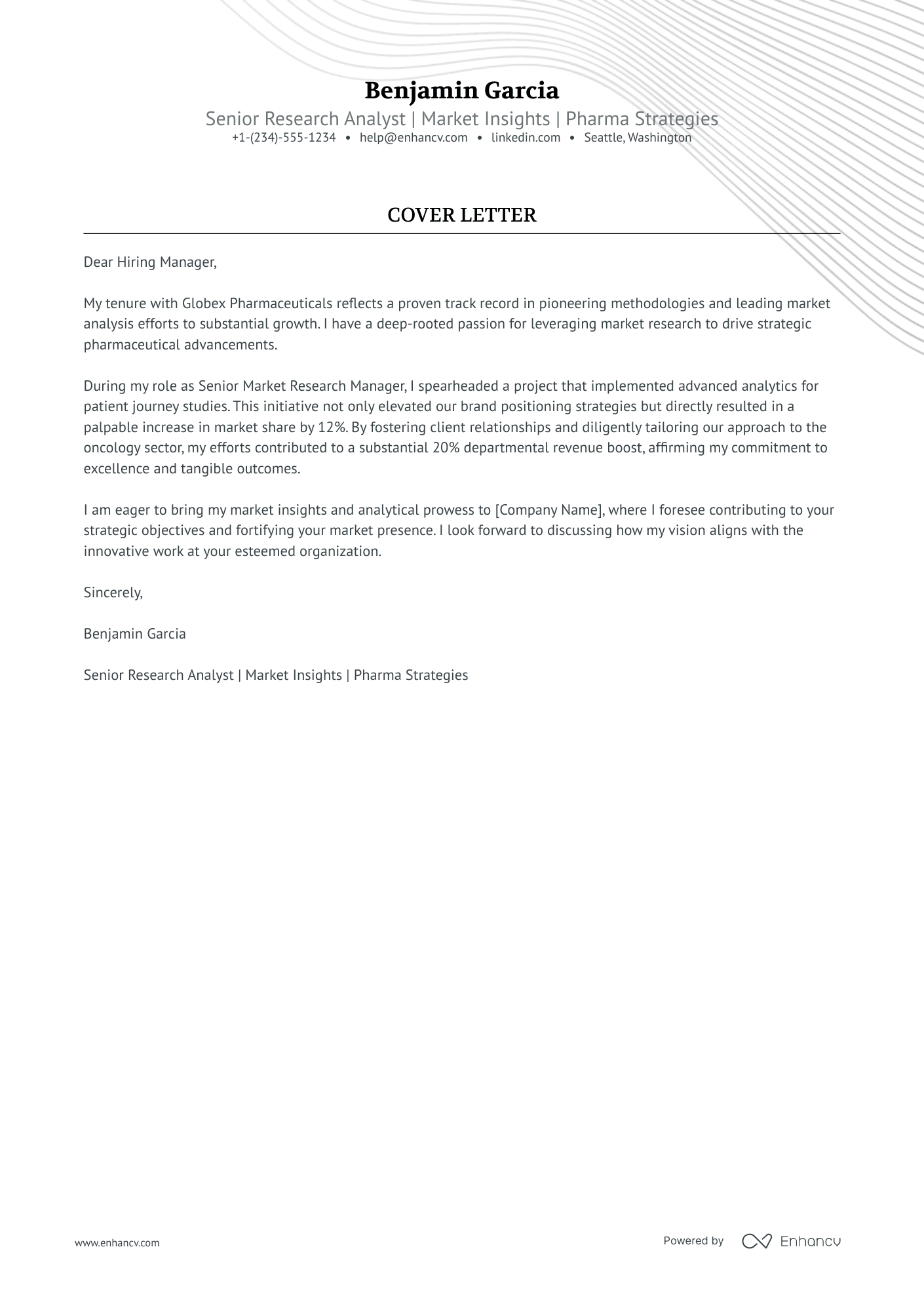
Research Director
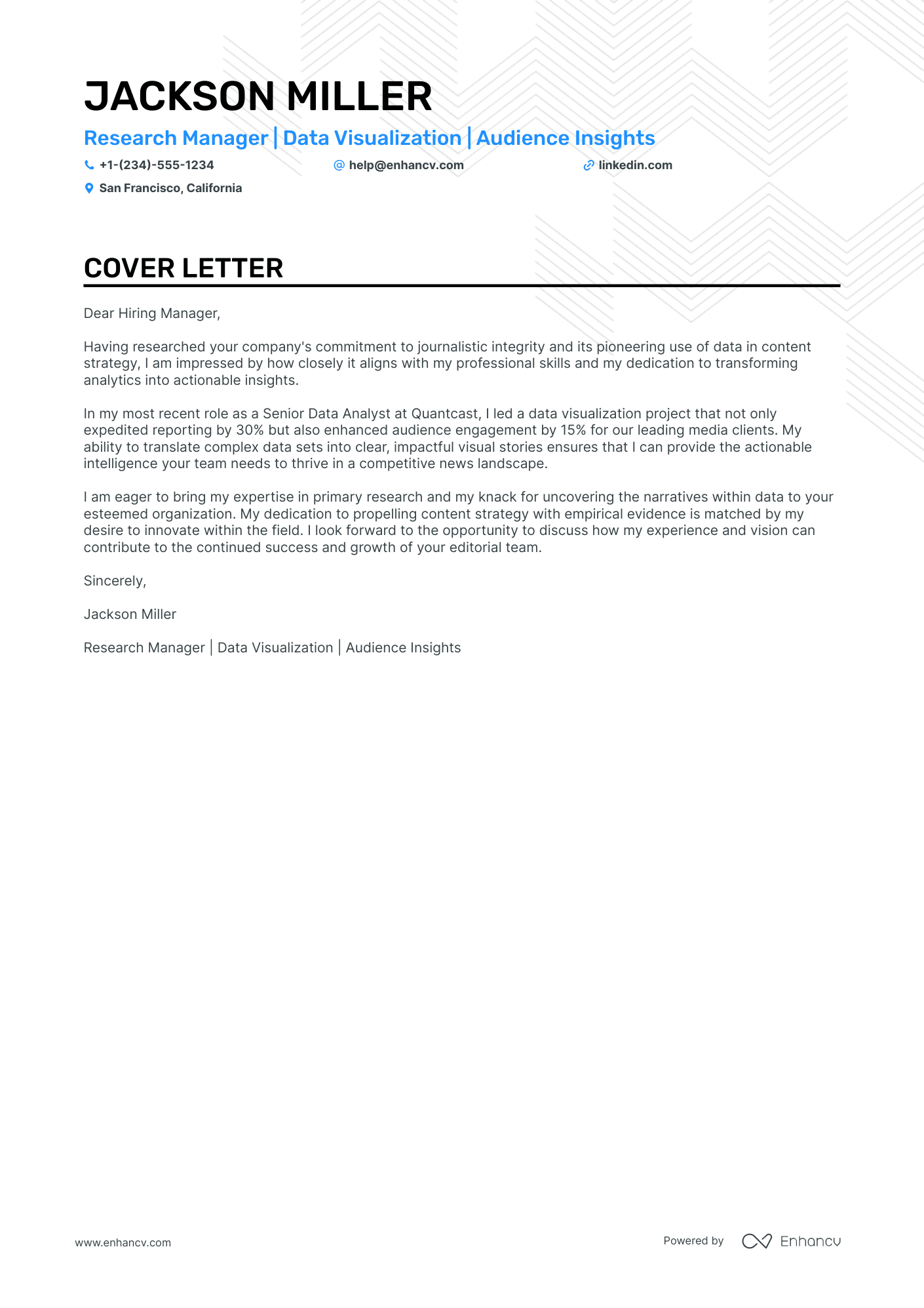
Research Manager
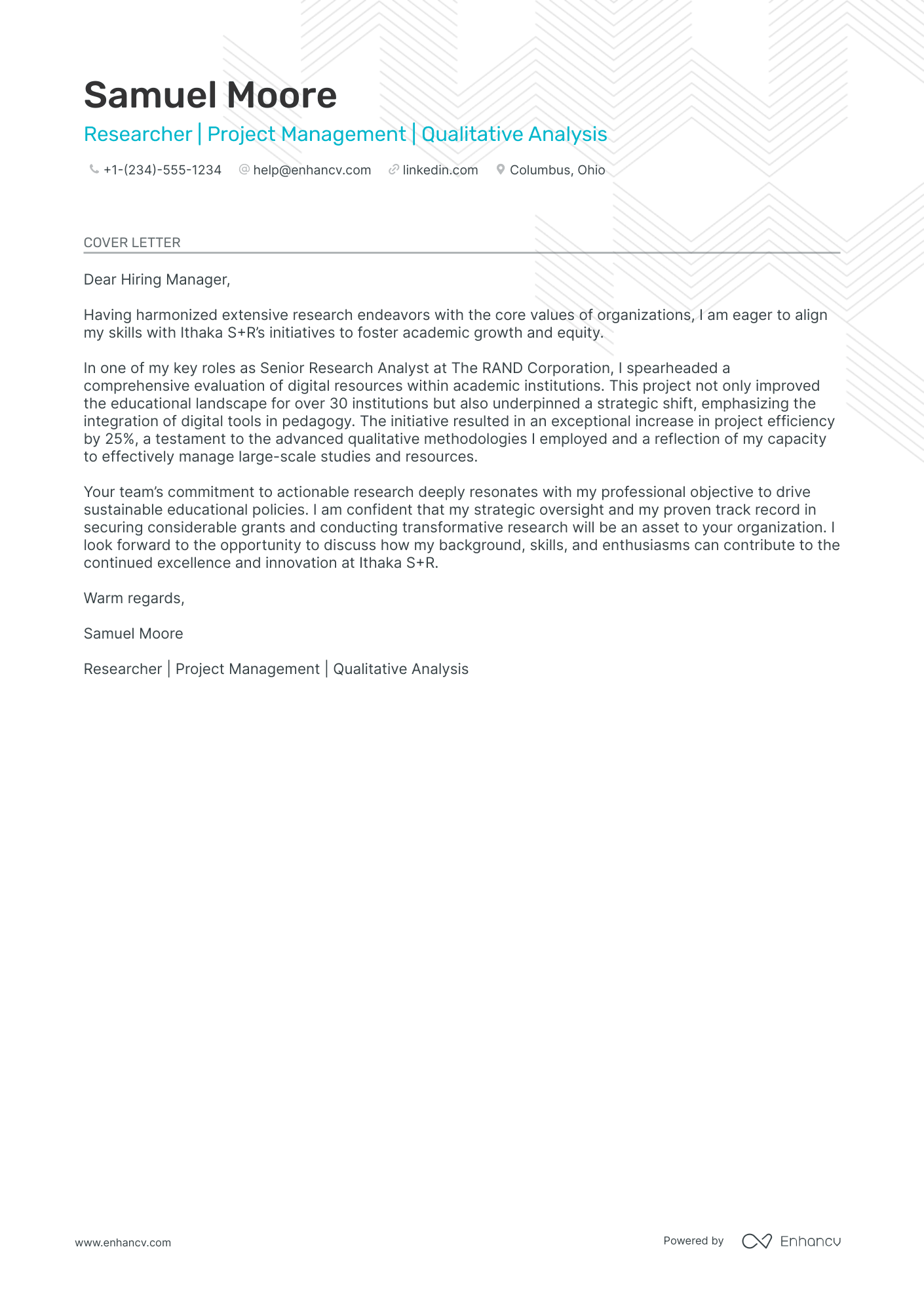
Clinical Research Assistant
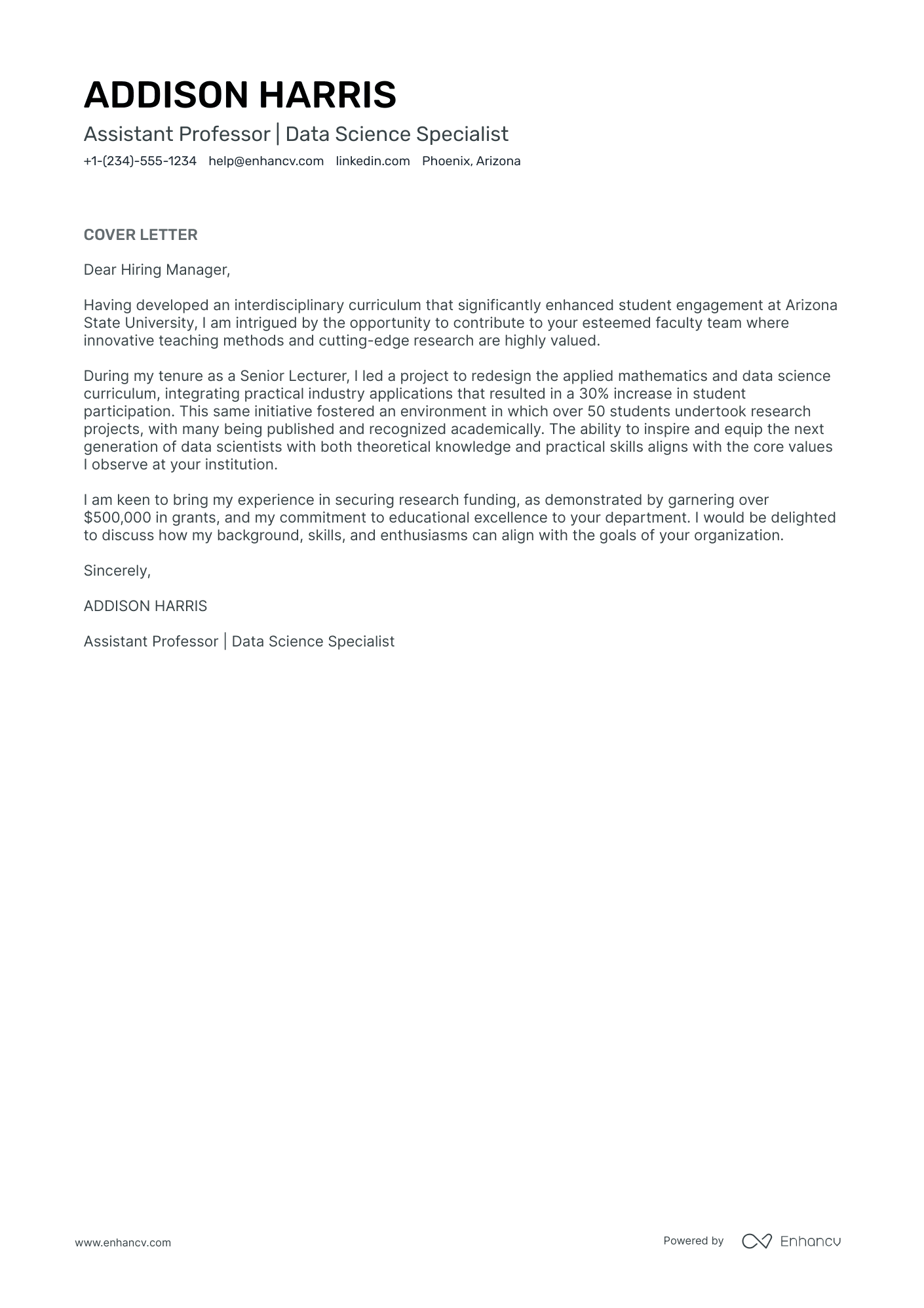
Postdoctoral Research Assistant
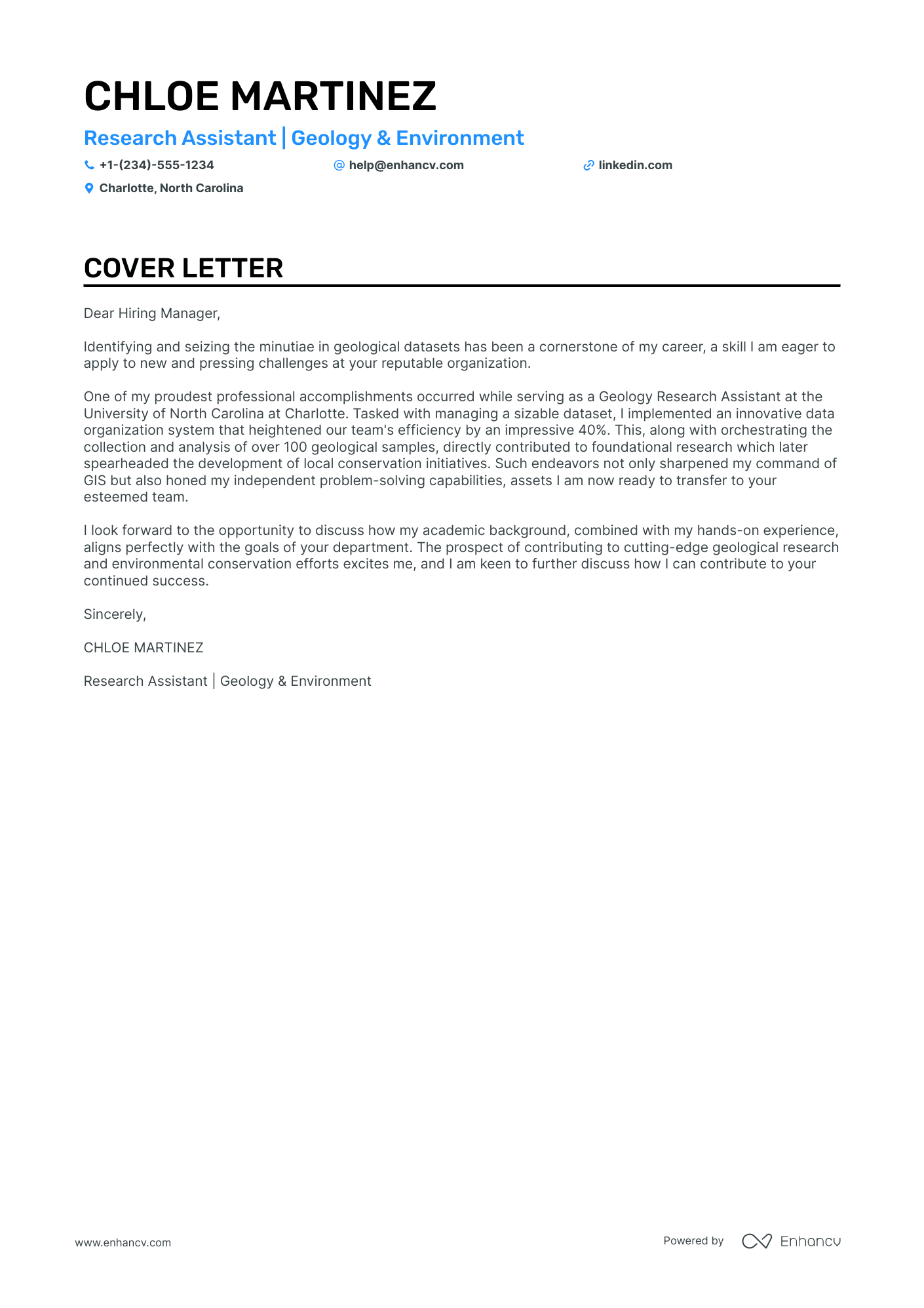
Undergraduate Research Assistant
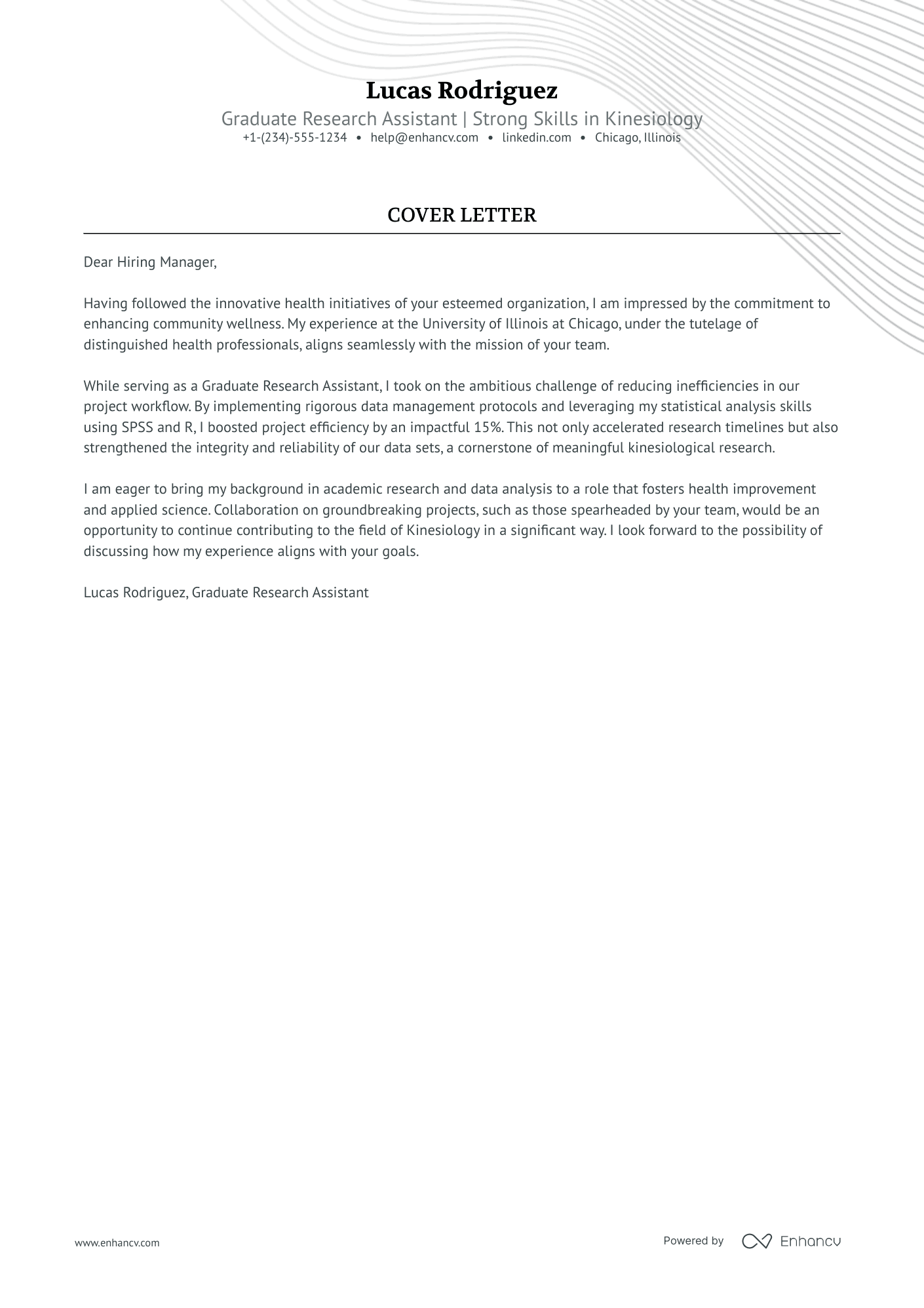
Graduate Research Assistant
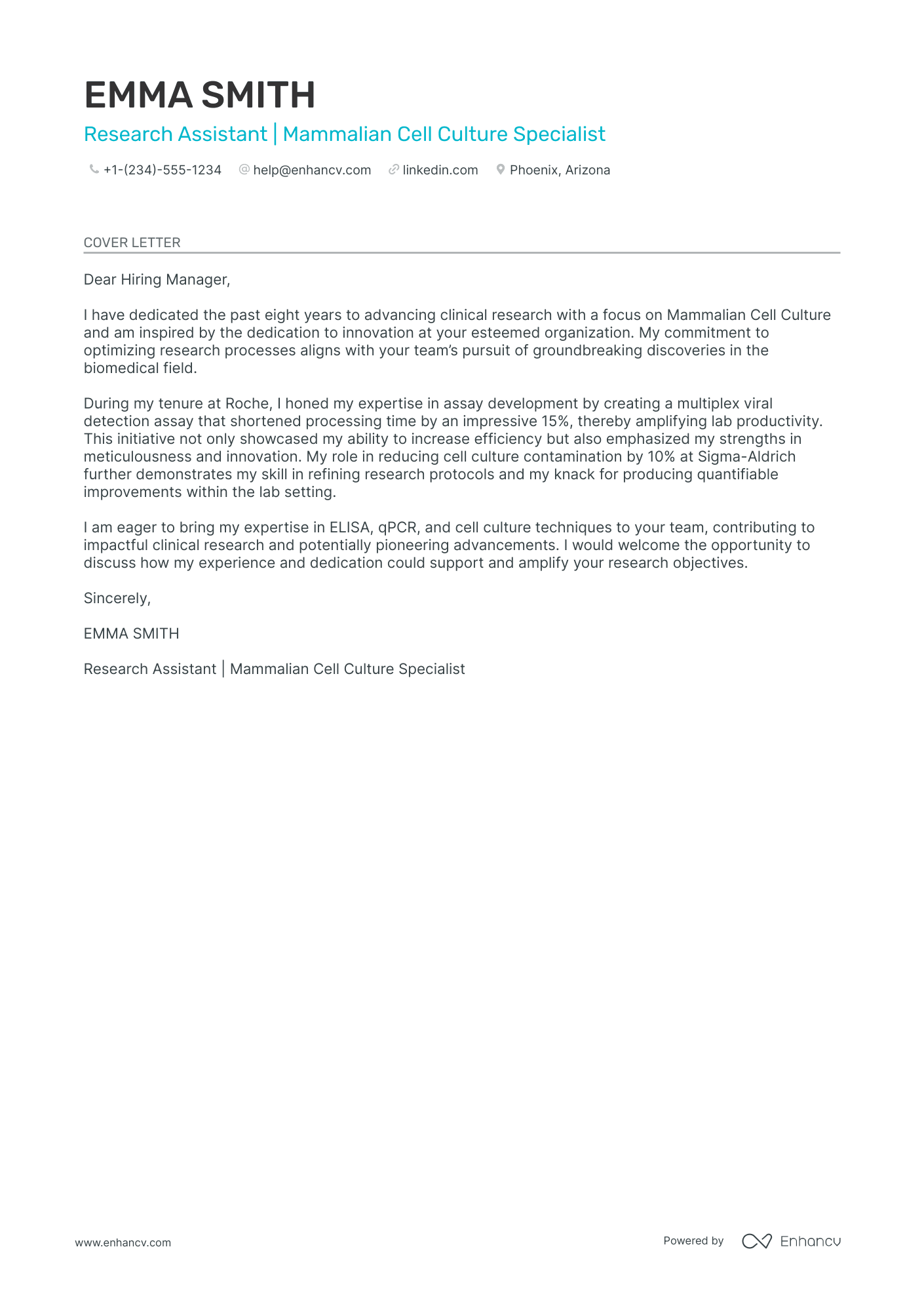
Laboratory Research Assistant
Cover letter guide.
Research Assistant Cover Letter Sample
Cover Letter Format
Cover Letter Salutation
Cover Letter Introduction
Cover Letter Body
Cover Letter Closing
No Experience Research Assistant Cover Letter
Key Takeaways
By Experience

Embarking on the quest for a research assistant role, you've likely encountered the pivotal step of crafting a compelling cover letter. It's not just about parroting your resume; your cover letter should weave a narrative around a standout professional triumph, capturing the essence of your expertise without resorting to overused clichés. Remember, keeping it concise within a single page is key. Let's navigate these waters together, ensuring your cover letter showcases your achievements with clarity and impact.
- Introduce your profile to catch recruiters' attention;
- Use professional templates and examples to make sure your research assistant cover letter follows the best industry standards;
- Settle on your most story-worthy achievement to shine a light on what makes your application unique;
- Write a research assistant cover letter, even when you lack professional experience.
Ready to start with the basics: upload your resume to Enhancv's AI, below, to see the research assistant cover letter it would write for you.
If the research assistant isn't exactly the one you're looking for we have a plethora of cover letter examples for jobs like this one:
- Research Assistant resume guide and example
- Research Director cover letter example
- Lab Technician cover letter example
- Entry Level Chemist cover letter example
- Quantitative Researcher cover letter example
- Quality Control Chemist cover letter example
- Chemist cover letter example
- Researcher cover letter example
- Student Researcher cover letter example
- Scientist cover letter example
- Biology cover letter example
Research Assistant cover letter example
ISABELLA ADAMS
New York City, New York
+1-(234)-555-1234
- Tailoring Experience to the Job Role: Mentioning the achievement of increasing efficiency in data collection processes for clinical trials directly relates to a key function of a Research Coordinator, thereby emphasizing relevant experience.
- Demonstrating Quantifiable Achievements: The cover letter highlights a specific metric of success – a 25% increase in efficiency – which demonstrates the candidate's ability to deliver measurable results.
- Attention to Data Privacy and Integrity: Research Coordinators must ensure the highest standards of data management. The applicant underscores her commitment to this aspect by citing past experience in maintaining data privacy and integrity.
- Proactive Problem Solving: The applicant describes how she proactively coordinated with research teams to improve operations, showcasing her problem-solving skills and initiative – qualities that are highly valued for a Research Coordinator position.
What about your research assistant cover letter format: organizing and structuring your information
Here is one secret you should know about your research assistant cover letter assessment. The Applicant Tracker System (or ATS) won't analyze your cover letter.
You should thus focus on making an excellent impression on recruiters by writing consistent:
- Introduction
- Body paragraphs (and explanation)
- Promise or Call to action
- Signature (that's optional)
Now, let's talk about the design of your research assistant cover letter.
Ensure all of your paragraphs are single-spaced and have a one-inch margins on all sides (like in our cover letter templates ).
Also, our cover letter builder automatically takes care of the format and comes along with some of the most popular (and modern) fonts like Volkhov, Chivo, and Bitter.
Speaking of fonts, professionals advise you to keep your research assistant cover letter and resume in the same typography and avoid the over-used Arial or Times New Roman.
When wondering whether you should submit your research assistant cover letter in Doc or PDF, select the second, as PDF keeps all of your information and design consistent.
The top sections on a research assistant cover letter
- Header: Include your name, contact information, and the date to ensure the recruiter knows who you are and how to reach you, which establishes professionalism and attention to detail.
- Greeting: Address the hiring manager or lead researcher by name if possible to personalize your cover letter and immediately demonstrate your commitment to building professional relationships.
- Introduction: Open with a clear statement about your interest in the research assistant role and your relevant educational background, which is critical in showing your enthusiasm and foundation for the position.
- Body: Elaborate on your research experience, technical skills, and any relevant coursework or projects, emphasizing how these uniquely qualify you for the research assistant position and demonstrate your ability to contribute meaningfully to the research team.
- Closing: Affirm your interest in the role and suggest an in-person or virtual meeting to discuss how you can contribute to their ongoing research projects, showing initiative and eagerness to engage further with the team.
Key qualities recruiters search for in a candidate’s cover letter
- Attention to Detail : Essential for ensuring accuracy in data collection, analysis, and reporting findings in research.
- Analytical Skills : Important for interpreting data, identifying patterns, and contributing to research outcomes.
- Technical Proficiency : Ability to use various research tools and software pertinent to the field of study.
- Relevant Research Experience : Previous involvement in research projects or familiarity with the subject matter shows readiness to contribute effectively.
- Strong Writing Abilities : Necessary for drafting research proposals, reports, and publications.
- Time Management : Capability to handle multiple tasks, meet deadlines, and manage the research timeline efficiently.
Kick off your research assistant cover letter: the salutation or greeting
When writing your research assistant cover letter, remember that you're not writing for some complex AI or robot, but for actual human beings.
And recruiters, while on the lookout to understand your experience, would enjoy seeing a cover letter that is tailored to the role and addresses them . Personally.
So, if you haven't done so, invest some time in finding out who's the hiring manager for the role you're applying to. A good place to start would be LinkedIn and the corporate website.
Alternatively, you could also get in touch with the company to find out more information about the role and the name of the recruiter.
If you haven't met the hiring manager, yet, your research assistant cover letter salutation should be on a last-name basis (e.g. "Dear Mr. Donaldson" or "Dear Ms. Estephan").
A good old, "Dear HR Professional" (or something along those lines) could work as your last resort if you're struggling to find out the recruiter's name.
List of salutations you can use
- Dear Hiring Manager,
- Dear [Name of the Principal Investigator or Supervisor],
- Dear [Research Department Head],
- Dear Dr. [Last Name],
- Dear Professor [Last Name],
- Dear Search Committee,
First introductions in your research assistant cover letter
Within your research assistant cover letter introduction , genuinely state what you like about the organization.
Research the latest company projects, honorary awards, company updates, etc.
Write up to two sentences to let recruiters know what impresses you about the company,
This would help you to set a good tone for the rest of the communication.
Storytelling in the middle (or body) of your research assistant cover letter
You've got your whole resume sorted, detailing your achievements and skills. What else can you write in your research assistant cover letter ?
For starters, take the time to re-assess the job requirements and re-discover the most crucial skills and requirements (or keywords).
After making a list of these important keywords, look back on your experience to select just one of your past accomplishments.
Choose the achievement that is the most noteworthy, relevant to the role, and matches the required skills.
Use the next between three and six paragraphs to narrate how:
- you've grown your skill set, thanks to your achievement;
- you'd use the know-how you've gained in your new role;
- your accomplishment could help your potential employers grow.
Remember that recruiters don't need a retelling of your whole resume, but want to find out what makes you, you.
Ending your research assistant cover letter: a closing paragraph with a promise
If you're thinking of finishing your research assistant cover letter with a "Sincerely yours" or "Thanks for the consideration," you need to read on.
End the final paragraph of your research assistant cover letter with a twist:
- a promise - of how you'd grow as a professional, part of the company, or improve organizational metrics;
- a call to action - prompt interviewers with some follow-up actions if they are interested in your profile.
A personalized ending would surely help you to stand out by being a memorable candidate.
Keep this in mind when writing your zero experience research assistant cover letter
Even though you may not have any professional experience , your research assistant cover letter should focus on your value.
As a candidate for the particular role, what sort of skills do you bring about? Perhaps you're an apt leader and communicator, or have the ability to analyze situations from different perspectives.
Select one key achievement from your life, outside work, and narrate a story that sells your abilities in the best light.
If you really can't think of any relevant success, you could also paint the picture of how you see your professional future developing in the next five years, as part of the company.
Key takeaways
Writing your research assistant cover letter has never been easier, so remember to:
- Select a research assistant cover letter template that automatically meets industry formatting (e.g. has one-inch margins, is single-spaced, is in PDF, etc.);
- Make your research assistant cover letter personal by mentioning the recruiters' first or last name;
- Within the introduction, describe what you like best about the company in no more than two sentences;
- Use your research assistant cover letter body to tell a story of your greatest achievement, backed up by job-relevant skills and technologies;
- If you have no professional experience, be honest about it in your research assistant cover letter, but also write about your unique talents.
Research Assistant cover letter examples
Explore additional research assistant cover letter samples and guides and see what works for your level of experience or role.

Cover letter examples by industry

AI cover letter writer, powered by ChatGPT
Enhancv harnesses the capabilities of ChatGPT to provide a streamlined interface designed specifically focused on composing a compelling cover letter without the hassle of thinking about formatting and wording.
- Content tailored to the job posting you're applying for
- ChatGPT model specifically trained by Enhancv
- Lightning-fast responses

How to write about your career for an effective resume
How to identify and embed your company culture to grow your business, 15 top career coaches and coaching services to help you succeed, how to get a green industry job – essential skills and 20+ green careers (with salaries), take it or leave it: whether to take a contract job and how to quit one, how to show you're a phi beta kappa student on your resume.
- Create Resume
- Terms of Service
- Privacy Policy
- Cookie Preferences
- Resume Examples
- Resume Templates
- AI Resume Builder
- Resume Summary Generator
- Resume Formats
- Resume Checker
- Resume Skills
- How to Write a Resume
- Modern Resume Templates
- Simple Resume Templates
- Cover Letter Builder
- Cover Letter Examples
- Cover Letter Templates
- Cover Letter Formats
- How to Write a Cover Letter
- Resume Guides
- Cover Letter Guides
- Job Interview Guides
- Job Interview Questions
- Career Resources
- Meet our customers
- Career resources
- English (UK)
- French (FR)
- German (DE)
- Spanish (ES)
- Swedish (SE)
© 2024 . All rights reserved.
Made with love by people who care.
Research Officer Cover Letter Examples
A great research officer cover letter can help you stand out from the competition when applying for a job. Be sure to tailor your letter to the specific requirements listed in the job description, and highlight your most relevant or exceptional qualifications. The following research officer cover letter example can give you some ideas on how to write your own letter.

or download as PDF
Cover Letter Example (Text)
Rubyann Poleon
(992) 830-8586
Dear Haneefah Apon,
I am writing to express my interest in the Research Officer position at Pfizer Inc. as advertised. With a solid foundation in pharmaceutical research from my tenure at Gilead Sciences, Inc., and a total of five years dedicated to advancing therapeutic innovations, I am excited about the opportunity to contribute to Pfizer's commitment to global health.
During my time at Gilead Sciences, I honed my skills in designing and conducting a range of scientific studies, focusing primarily on antiviral drug development. My role demanded a meticulous approach to experimental design, an in-depth understanding of regulatory requirements, and a collaborative spirit to work effectively with cross-functional teams. I am proud to have been part of projects that have contributed to significant advancements in treatments for various diseases, reflecting both my passion for research and my commitment to impactful outcomes.
I have always admired Pfizer's leadership in the pharmaceutical industry and the company's relentless pursuit of medical breakthroughs. Your innovative culture, especially in the development of vaccines and targeted therapies, resonates with my professional philosophy and aspirations. I am eager to bring my expertise in data analysis, project management, and strategic planning to your esteemed research team, as well as my strong communication skills that are critical for articulating research findings and influencing decision-making processes.
Moreover, my experience in navigating the complex landscape of drug development has equipped me with the agility to adapt to the fast-paced environment at Pfizer. I am well-versed in the latest research methodologies and technologies, and I am continually seeking to stay at the forefront of scientific advancements. My proactive approach to learning and professional development ensures that I bring the most current and effective practices to my work.
In closing, I am enthusiastic about the possibility of joining Pfizer Inc. and contributing to your mission of discovering, developing, and delivering innovative medicines that significantly improve people's lives. I am confident that my background, skills, and dedication to scientific excellence would make a valuable addition to your team. I look forward to the opportunity to discuss how my experience and vision align with the goals of Pfizer.
Thank you for considering my application. I am hopeful for the chance to further discuss how I can contribute to the groundbreaking work being done at your company.
Warm regards,
Related Cover Letter Examples
- Research and Development Engineer
- Research Nurse
- Research Administrator
- Research Analyst
- Research Associate
- Research Biologist

Clinical Research Coordinator Cover Letter: Sample & Tips
Want to craft a Perfect cover letter for your dream job as a Clinical Research Coordinator? This guide will show you how!

Shaoni Gupta
Read more posts by this author.
A strong cover letter is crucial when applying for a clinical research coordinator position. This document serves as your first impression to potential employers and offers an opportunity to showcase your skills, experience, and enthusiasm for the role.
In this blog post, we have templates for both experienced and non-experienced candidates. We also discuss the key elements to include in your clinical research coordinator cover letter and provide tips to make it stand out.
Clinical Research Coordinator Cover Letter Sample For Experienced Candidates

[Your Name] [Your Address] [City, State, Zip Code] [Email Address] [Phone Number]
[Employer's Name] [Company/Organization Name] [Company Address] [City, State, Zip Code]
Dear [Employer's Name],
I am writing to express my interest in the Clinical Research Coordinator position at [Company/Organization Name], as advertised. With over [number] years of experience in managing clinical trials and coordinating research efforts, I am eager to bring my expertise to your esteemed team.
In my current role at [Current Employer], I have successfully overseen a range of clinical trials, including [specific study examples]. My responsibilities encompassed patient recruitment, protocol development, and adherence to regulatory requirements such as FDA guidelines and GCP standards.
I am particularly proud of achieving [mention specific achievements, e.g., high participant retention rates, successful trial outcomes].
I excel at project management, meticulous record keeping, and fostering effective communication among multidisciplinary teams. My proficiency in data analysis tools and commitment to ethical research practices have consistently contributed to the advancement of medical knowledge.
I am impressed by [Company/Organization Name] 's dedication to [mention a specific aspect of their work, e.g., innovative research in [specific area]]. I am excited about contributing my skills and experience to your organization's mission.
Thank you for considering my application. I am eager to discuss how my background aligns with the needs of [Company/Organization Name]. Contact me at [Phone Number] or [Email Address] to schedule an interview as soon as possible.
[Your Name]
Clinical Research Coordinator Cover Letter Template For Experienced Candidates

[Employer's Name] [Hiring Manager's Title] [Company/Organization Name] [Company Address] [City, State, Zip Code]
I am excited to apply for the Clinical Research Coordinator position at [Company/Organization Name], as advertised. I am eager to contribute to your dedicated team with [number] years of experience in clinical research coordination and a passion for improving patient outcomes through innovative research.
During my tenure at [Current Employer or Previous Employer], I have successfully managed a variety of clinical trials, including [specific examples]. My role involved:
Overseeing study protocols.
Ensuring compliance with regulatory standards.
Managing data collection and analysis.
I achieved [mention specific achievements, e.g., high enrollment rates or successful study outcomes].
I possess strong organizational skills, attention to detail, and the ability to collaborate effectively with interdisciplinary teams. My commitment to ethical research practices and proficiency in regulatory requirements, including FDA regulations and GCP guidelines, have consistently supported the successful implementation of clinical trials.
I am impressed by [Company/Organization Name] 's commitment to [mention a specific aspect of their research or mission]. I am eager to bring my expertise in clinical trial management and passion for research advancement to your team.
Thank you for considering my application. I look forward to discussing how my skills and experiences align with the needs of [Company/Organization Name]. Please feel free to contact me at [Phone Number] or [Email Address] to schedule an interview as soon as possible.
Sincerely, [Your Name]
Clinical Research Coordinator Cover Letter Sample For Freshers

I am writing to express my interest in the Clinical Research Coordinator position at [Company/Organization Name]. As a recent graduate with a Bachelor's degree in [Your Field], I am eager to contribute to your team and apply my academic background in clinical research to practical settings.
Through coursework and internships, I have developed a strong foundation in clinical trial management, patient recruitment, and data analysis. At [Name of University or Internship Organization], I assisted in research projects where I learned to adhere to ethical guidelines and regulatory requirements, gaining hands-on experience with FDA regulations and GCP guidelines.
I am particularly drawn to [Company/Organization Name] 's commitment to [mention a specific aspect of their research or mission]. I am eager to bring my enthusiasm for research and fresh perspectives to your organization to support your innovative initiatives.
Thank you for considering my application. I am enthusiastic about the opportunity to discuss how my academic background and internship experiences have prepared me for the role of a Clinical Research Coordinator at [Company/Organization Name]. Contact me at [Phone Number] or [Email Address] to schedule an interview.
Clinical Research Coordinator Cover Letter Template For Freshers

I am writing to apply for the Clinical Research Coordinator position at [Company/Organization Name]. With a recent Bachelor's degree in [Your Field] and a strong interest in clinical research, I am eager to begin my career and contribute to your esteemed team.
During my academic studies at [Name of University], I gained foundational knowledge in clinical trial design, data management, and ethical research practices. My coursework in [specific relevant courses] equipped me with essential skills in analyzing research data and understanding regulatory requirements, including FDA regulations and GCP guidelines.
I am particularly impressed by [Company/Organization Name] 's commitment to [mention a specific aspect of their research or mission]. I am excited about the opportunity to apply my academic knowledge and passion for research to contribute to your innovative projects.
Thank you for considering my application. I look forward to discussing how my academic background and enthusiasm for clinical research align with the needs of [Company/Organization Name]. Please get in touch with me at [Phone Number] or [Email Address] to schedule an interview.
How To Write a Clinical Research Coordinator Cover Letter?
Step 1- Create a strong introduction
To write a strong introduction for a clinical research coordinator cover letter, start by addressing the hiring manager by name and stating the position you are applying for. Express your enthusiasm for the role and highlight your relevant experience in clinical research.
For example:
Weak Introduction :
To Whom It May Concern,
I am writing to apply for the Clinical Research Coordinator position at your company. I have some experience in research, and I am a good fit for the position. I am looking for a new job and believe your company might be an excellent workplace.
Strong Introduction :
Dear Dr. Smith,
I am excited to apply for the Clinical Research Coordinator position at HealthFirst Medical Center. With over five years of experience in coordinating clinical trials and a proven track record in managing complex research projects, I am eager to bring my skills and dedication to your team. My background in patient coordination, data analysis, and regulatory compliance aligns perfectly with the requirements of this role, and I am passionate about contributing to innovative medical research at HealthFirst.
Step 2- Create a substantial body of content
To create a substantial body of content for a clinical research coordinator cover letter, focus on detailing your relevant experience, key skills, and notable accomplishments. Highlight specific clinical trials you have managed, emphasizing your expertise in project management, data analysis, and patient coordination.
Weak Body of Content :
I have worked as a Clinical Research Coordinator for a few years and have some experience with clinical trials. My duties included recruiting patients, collecting data, and ensuring everything was done correctly. I did an excellent job because I didn't have many problems. I don't have any specific awards, but I always try my best. I want to work at your company because it would be an excellent place to grow my career.
Strong Body of Content:
In my current role as a Clinical Research Coordinator at XYZ Medical Center, I have successfully managed over ten clinical trials, including a complex multi-center study on a novel cancer treatment. My responsibilities included patient recruitment, data collection, and strict adherence to FDA regulations and GCP guidelines. I have consistently achieved high participant retention rates, reaching 95% in my most recent study, and have been recognized with the "Excellence in Clinical Research" award for my performance.
Step 3- Create a Strong Ending
Creating a strong ending for a clinical research coordinator's cover letter involves summarizing your interest in the position and reiterating your qualifications.
End with a call to action, such as inviting the hiring manager to contact you for an interview and thanking them for considering your application. This will leave a positive, lasting impression and show your eagerness to move forward in the hiring process.
Weak Ending
Please consider me for the job. I would be a good fit and could learn a lot from working at your company. Please let me know if you want to interview me. Thank you for your time.
Strong Ending
I am enthusiastic about the opportunity to bring my expertise in clinical trial coordination to HealthFirst Medical Center and contribute to your groundbreaking cardiovascular research. I am confident that my project management, patient coordination, and regulatory compliance skills will be valuable assets to your team. I look forward to discussing how my background, skills, and certifications align with your organization's needs. Thank you for considering my application. Please contact me at your earliest convenience to schedule an interview.
Tips for Writing a Cover Letter For Clinical Research Coordinator
1.Tailor Your Letter to the Job Description:
Carefully read the job description and highlight the qualifications and skills the employer seeks. Tailor your cover letter to address these requirements directly.
Include Hard and Soft Skills:
Hard Skills
Clinical Trial Management: Experience in planning, conducting, and managing clinical trials.
Regulatory Compliance: Knowledge of FDA regulations, GCP guidelines, and IRB processes.
Data Analysis: Proficiency in using clinical trial management systems (CTMS) and electronic data capture (EDC) tools.
Project Management: Ability to manage timelines, resources, and project documentation.
Medical Terminology: Understanding of medical terminology and clinical procedures.
Protocol Development: Experience in developing and implementing study protocols.
Soft Skills
Communication: Strong verbal and written communication skills for interacting with patients, researchers, and regulatory bodies.
Detail-Oriented: Meticulous attention to detail for accurate data collection and reporting.
Organizational Skills: Ability to manage multiple tasks and prioritize effectively.
Problem-Solving: Proactive in identifying issues and implementing solutions.
Team Collaboration: Ability to work effectively within a multidisciplinary team.
Patient Interaction: Compassionate and professional in handling patient recruitment and coordination.
2.Use a Professional Format:
Follow a professional format, including your contact information, the Date, and the employer's contact information at the top of the letter. Use a formal salutation, such as " Dear [Hiring Manager's Name] ."
3.Provide Specific Examples:
Use specific examples to demonstrate your skills and achievements. For instance, mention a clinical trial you managed, including details about your role and the outcome.
4.Demonstrate Knowledge of Regulatory Compliance:
Highlight your understanding of regulatory requirements, such as FDA regulations and GCP guidelines, and provide examples of how you have ensured compliance in previous roles.
Mistakes to Avoid
Here are a few mistakes you should avoid while writing a cover letter as a clinical research coordinator:
1.Not Providing Contact Information:
Make sure the letter has your contact details at the top. Provide the recruiting manager with a simple way to contact you.
2.Weak Introduction and Conclusion:
Avoid starting with a generic or unenthusiastic opening. Similarly, only end your letter with a clear call to action, such as inviting the hiring manager to contact you for an interview.
3.Being Too Formal or Too Casual:
To set the correct tone, be professional without being unduly formal. Make sure your tone is courteous and upbeat, and avoid jargon and extremely complicated vocabulary.
4.Typos and Grammatical Errors:
Make sure your cover letter is well edited to eliminate typos or grammatical issues. If you make these errors, you could come across as sloppy and unprofessional.
5.Failing to Show Enthusiasm:
Show that you are interested in the job and the organization. A lack of zeal may detract from the strength of your application.
Here's a collection of cover letters for different jobs that you can explore:
Cover Letter for Freelance Writer
Office Manager Cover Letter
Custodian Cover Letter
Venture Capital Cover Letter
Cover Letter for Biomedical Scientists
Key Takeaways
Highlight Your Unique Value: Highlight the special skills and background that make you stand out from the competition for the position of clinical research coordinator.
Tailor Each Application: To make an impression on hiring managers, tailor each cover letter to the job description and corporate values.
Showcase Relevant Skills: Give a clear demonstration of your hard and soft abilities and concrete instances of how you have used them to succeed in previous positions.
Maintain Professionalism: When writing your cover letter, stick to a formal tone and format and avoid frequent errors like typos and too formal or informal wording.
Express Enthusiasm: Express enthusiasm for the opportunity and the company's objective, concluding with a call to action that will inspire additional participation.

This article has been written by Shaoni Gupta. She works as a content writer at Vantage Lens . Her areas of interest range from art to astronomy. When she's not writing, she is daydreaming about stepping into the worlds of high fantasy novels.
Join for job search assistance, workplace tips, career guidance, and much more
Search RH Smith Office of Career Services
- Graduate Students
- Undergraduate Students
- Ways to Engage
- Meet our Employer Relations Team
- Employment Statistics
- Getting Started
- Business Management
- Consumer Products, E-Commerce and Retail
- Entrepreneurship
- Government, Nonprofit & Education
- International Business
- Real Estate & Construction
- Sports, Entertainment & Hospitality
- Supply Chain Management & Operations
- Technology & Analytics
- Career Exploration
- Job Search Strategies
- Resume & Cover Letter
- Interview Preparation
- Offer Decision-Making & Negotiation
- Professional Competencies
- Technical Competencies
- Graduate School Preparation
- Student Outcomes
- Meet the Team
7 Essential Tips on How to Format a Cover Letter
- Share This: Share 7 Essential Tips on How to Format a Cover Letter on Facebook Share 7 Essential Tips on How to Format a Cover Letter on LinkedIn Share 7 Essential Tips on How to Format a Cover Letter on X
7 Essential Tips on How to Format a Cover Letter was originally published on Resume.io .

When you come to writing one of the most important letters in your life, you may need a few ground rules to help you to get started with the format of your cover letter.
That blank page can look awfully daunting otherwise.
Here are some must-follow tips around the structure and content of your cover letter:
Well-designed header
The header section of the cover letter should be attractive and space efficient. Graduates might be tempted to select a header design that reduces the amount of space that they need to fill for their cover letter, but you will have more to say than you think.
The header should contain all essential contact details (in addition to those on your resume) – full name, email, and mobile. You don’t have to include your full address and you definitely don’t have to include the “inside address” of your employer.
Mouthwatering intro
The intro of a recent grad or early career cover letter should be far more than a “this is what I want out of my career.” The hiring manager understands that you want the job – applicants need to prove to them that they are worthy of it. Make a compelling case.
The cover letter introduction should lead with your most relevant accomplishment for the role in question, with a hint of personality around how you achieved it. Avoid a generic cover letter that you send to everyone – you might not have much experience, but you should still strive to be as selective as possible.
Only relevant career stories with context
The length and content of your cover letter should be dictated by the amount of relevant experience that you have to share. Do not feel that you need to fill a page by parroting the responsibilities of the role or long lists of skills and personality traits without evidence.
Empty space is better than empty words – employers will value quality over quantity for the early career professional. What they want to understand in the cover letter is that you understand the demands of the role and can justify why you think you will do a good job.
Conclusion with call-to-action
End the conclusion of the early-career cover letter with a final detail about your personality and motivation and share your interest in learning more about the role. Saying that you hope to have the opportunity of an interview to learn more about the role is a powerful call-to-action which demonstrates your belief in yourself. Remember to keep the tone hopeful.
After the raw content come the syntax and visual choices:
Powerful action verbs
When you only have a certain number of sentences to create a favorable impression, your choice of verb can have a surprising impact on how your messages are received. Insightful action verbs can add a new level of meaning. Did you “manage” or “orchestrate” a project?
A word of warning: sprinkle action verbs and other buzzwords liberally. The cover letter should read like a conversation starter, so ensure that it sounds natural enough.
Impactful fonts, sensible sizes, and shot paragraphs
Increasingly the font size to take up more space on the page will fool no one. Stick with a standard 10 or 12 size and choose a suitable professional font that is easy to read.
Use short 2-4-line non-indented paragraphs and leave a line between each one. Give the reader a natural break between each of your career stories and consider using bullet points for your greatest accomplishments (the ones that you can ideally quantify with numbers). The cover letter should be strictly no more than one page – ideally aim for 3/4 of a page.
Right choice of template
Finally, very few cover letters or resumes are send as a blank word document these days. There are a wide choice of resume and cover letter templates – it is a great idea to use the same visual look for both your cover letter and resume. When a hiring manager is viewing a large number of candidates, this association will stick in their minds.
There is a subtle art to writing a persuasive cover letter when you do not have experience.
Strike a balance between outlining hopes for the future and sharing the greatest hits from your past. Your future employer will want to understand both.
If you are curious to explore further (you should be), the following article from Resume.io provides substantial further food for thought: “ How to Format a Cover Letter in 2022: Examples and Tips ”
More From Forbes
How to answer “why are you interested in this role” in 2024.
- Share to Facebook
- Share to Twitter
- Share to Linkedin
The key to answer "Why do you want this job?" is to research the role and highlight unique angles ... [+] that are not typical of the job
You've been practicing for weeks.
You've (finally) figured out how to answer all the tough interview questions you know you're likely to be asked for your dream remote job.
But for some reason, you can never quite get past this question: "Why are you interested in this job/position/role?"
In theory, it's a ridiculously easy question to answer. Because why on earth would the hiring manager ask you that question when you are clearly motivated for the job? Surely, you wouldn't apply unless it was something you were interested in, right?
And at the end of the day, especially if you've been out of work for months or even years, why else would you want a job except to get back on your feet again? The answer to "Why are you interested in this role?" may seem fairly obvious—but you're wrong.
Applying for a job because you are in it mainly for the salary, because it's work-from-home, or applying because you like the idea of the prestige associated with the role itself or the employer, are not sufficient enough motivations to ensure wholehearted commitment to your job—and these will certainly not pass as good enough reasons for the hiring manager to take you seriously and hire you.
You need to provide the talent acquisition team and hiring manager with something more tangible and meaningful to persuade them that you are committed to the job as a career, a stepping stone, and not just something to make money and survive. Otherwise, any wise employer knows that without the right motivations, an employee will quickly lose interest and either job hop or prove unreliable and distracted when on the job.
Best High-Yield Savings Accounts Of 2024
Best 5% interest savings accounts of 2024, why does the hiring manager ask "why are you interested in this role".
Employers may ask the same thing in different ways. For instance, they may rephrase this question as, "What made you apply for this position?" or "What interests you most about this role?"
These are all fundamentally the same, and employers ask this to gauge several key insights about you, including:
- Your motivation, passion, and enthusiasm for the role
- Would your expectations align with the reality of the position and where the company is headed?
- Do your skills and experience perfectly match with the role?
- Are your personal and career goals aligned with the job? Do you even have any career goals, for that matter?
- Are you committed to adding vale to the organization?
- Do you understand the role you have applied for and what it entails? Have you read the job advert thoroughly?
Employers want to ascertain that you understand the role and its requirements, and have the right ... [+] expectations
How To Answer "Why Are You Interested In This Position?" Effectively
To satisfy each of the points above effectively, here are some steps you should consider that will help you formulate a compelling answer for your remote job interview:
1. Research The Role
This is the most obvious step you should take, but you should remember that this research extends beyond the role itself (as the job title might vary in meaning depending on the company you work for). You should research the company and the specific project, department, team, or program your role is being recruited to fill. This enables you to have a thorough grasp of the position and understand if it is what you initially expected.
2. Highlight Unique Angles Of The Role
The next step is to highlight unique aspects of the role that appeal to you the most. This demonstrates that you have undertaken due diligence to research the job, and shows them that you are keen and committed to the role. For example, if you were being hired to work as a program manager, you could talk about the specific program that you know you will be managing, and how excited you are about the program and its objectives, especially if it is something that resonates with you personally.
You should also make reference to how you are well positioned to contribute in the company within this role, based on your unique background and career achievements.
3. Align Answer With Yours And The Company's Goals
Finally, you need to ensure that your answer makes strong reference to how this particular position is part of your career plan and will help you achieve your long-term career goals. This is especially necessary if you are making a career pivot, as employers will likely be extremely curious as to why you are completely switching roles and applying for a job that has no relation to anything you've done previously.
You should also consider the company's vision and mission statement, and ensure your overall answer conveys the value you aim to provide to their organization in helping them achieve their business goals.
Sample Answer For "Why Are You Interested In This Position?"
So, a sample answer for a program manager at a healthcare organization would be:
"I am excited about this program manager role at [company name] because it aligns perfectly with skills and personal career goals to [career goal in X number of years]. Throughout my career so far, I have been deeply passionate about driving strategic initiatives and overseeing complex community health projects from inception to successful completion. This role as a [name of role and team name] provides the ideal platform for me to leverage my experience in project management, team leadership, and process optimization.
Your career goals, and their alignment with the company's goals and values, play a major role in ... [+] determining if the job is a right fit
"One of the aspects that drew me to [company name] is your commitment to innovation and excellence within the industry. [Go into further detail, briefly, about a specific project they completed recently that resonates with your personal values and professional aspirations].
"In my previous position at [previous company], [relate how your background is perfectly suited to the requirements of the role].
"I am also particularly interested in the opportunity to work at [company name] because of your strong emphasis on professional development and employee growth. I am eager to bring my expertise to your team and continue to grow as a program manager in such a supportive environment, while being a part of a company that is leading the way in [specific industry]."
Structuring your answer in this way perfectly highlights to the interviewer just why your motivations, skills, and experience, make you a strong fit for the position.

- Editorial Standards
- Reprints & Permissions
Join The Conversation
One Community. Many Voices. Create a free account to share your thoughts.
Forbes Community Guidelines
Our community is about connecting people through open and thoughtful conversations. We want our readers to share their views and exchange ideas and facts in a safe space.
In order to do so, please follow the posting rules in our site's Terms of Service. We've summarized some of those key rules below. Simply put, keep it civil.
Your post will be rejected if we notice that it seems to contain:
- False or intentionally out-of-context or misleading information
- Insults, profanity, incoherent, obscene or inflammatory language or threats of any kind
- Attacks on the identity of other commenters or the article's author
- Content that otherwise violates our site's terms.
User accounts will be blocked if we notice or believe that users are engaged in:
- Continuous attempts to re-post comments that have been previously moderated/rejected
- Racist, sexist, homophobic or other discriminatory comments
- Attempts or tactics that put the site security at risk
- Actions that otherwise violate our site's terms.
So, how can you be a power user?
- Stay on topic and share your insights
- Feel free to be clear and thoughtful to get your point across
- ‘Like’ or ‘Dislike’ to show your point of view.
- Protect your community.
- Use the report tool to alert us when someone breaks the rules.
Thanks for reading our community guidelines. Please read the full list of posting rules found in our site's Terms of Service.

COMMENTS
First, they can probably figure out your name. You don't need that to be in the first sentence (or any of the sentences—the closing is an obvious enough spot). Next, "the open position" and "your company" are too generic. That sounds like the same cover letter you sent to every single employer in a hundred mile radius.
The national average salary of a researcher is $72,006 per year. This number can vary based on several factors, including where the researcher works and how much experience they have. For example, researchers working in New York, New York earn an average of $153,409 per year. Researchers may also enjoy benefits depending on their employers ...
Here are nine steps to help you compose a cover letter when submitting your research paper to a professional journal: 1. Set up the formatting. Set up your word processor to format your cover letter correctly. Formatting standards for research paper cover letters usually include: Using single spacing between each line.
Professional Researcher cover letter samples from real job applications. Including a writing template that you can use for your Researcher cover letter. Vetted by career experts at Enhancv. ... Research Manager cover letter example; Researcher cover letter example. Samuel Moore. Columbus, Ohio +1-(234)-555-1234.
Here's an example of a researcher's cover letter: Anna Paul 555-555-1212, [email protected], Toronto, Ontario, M4Y 2K1 Dear hiring manager, I'm writing to apply for the researcher position at your company. I'm confident that I'm the ideal candidate for the job because of my excellent research skills and experience.
17 July 2023. Alex Reed. 5508 Terrace Drive. La Crescenta, CA, 91214. (818) 835-3371. [email protected]. Dear Dr. Reed, I'm writing to you regarding the Lab Research Assistant position at BioSpace. I'm confident my academic background in molecular biology and biomedical research experience will make me a competent contributor to your team.
A research analyst is a specialist who analyzes, interprets and presents data in various fields, including marketing research, operations analysis, economic coordination and financial investigation. Writing a research analyst cover letter may give a resume more context and detail. Understanding which information to include and what format to follow may help you when creating a cover letter for ...
Researcher Cover Letter Sample. Dear Hiring Manager, I am writing to apply for the Researcher position at your esteemed organization. With a strong background in conducting academic and market research, I am confident in my ability to contribute to your team and deliver valuable insights.
Part 5: Drafting an entry-level research assistant cover letter Formatting your cover letter correctly. Your research assistant cover letter should be one page, single- or 1.5-spaced and contain 4-5 paragraphs. Each paragraph will have a specific purpose. Here's an outline showing the best format for research assistant cover letters.
Research Scientist Cover Letter Sample. Dear Dr. Smith, I am writing to apply for the Research Scientist position at ABC Company as advertised in the Times newspaper. With my strong background in scientific research, I am confident that I would be a great fit for your team.
Researcher cover letter example 3. CV templates. The example cover letters here should give you a good general idea on how your Researcher cover letter should be formatted and written. The rest of this guide gives more specific guidance on how to create your own cover letter in this format, and even includes some templates you can copy and paste.
When writing a cover letter, it is crucial to address the editor by their correct and complete name¹. If there are multiple co-editors, you can address your letter to the right person, based on their specialization or designated responsibilities. If unsure, it is okay to go with a more general salutation, such as "Dear Editors"¹.
Learn how to write a cover letter for journal article submission with this guide and template. Find out what to include, what to avoid, and how to highlight your research to the editor.
Example 1: Market Research Analyst Cover Letter. I am writing to express my interest in the Market Research Analyst position at Nielsen Holdings. With my strong background in market research and data analysis, I am confident in my ability to contribute to Nielsen's industry-leading insights and solutions.
Related: Short Cover Letter Samples (Plus Format, Tips and FAQs) 3. Address the cover letter to a specific person If possible, address your cover letter to a specific person rather than using a generic salutation. This makes the letter more personal. To find out who the hiring manager is, look at the job posting or contact the company directly.
Free Researcher cover letter example. Dear Mr. Roberts: When I learned of your need for an experienced and analytical Researcher to join your team, I hastened to send you my resume. As a detail-oriented and accomplished professional with more than eight years of experience facilitating sophisticated research projects, I possess a wide range of ...
[email protected]. Dear Mr. Park, I am writing to apply for the Research Associate position with Company Name. I hold five years of experience in academic and institutional research and have the skills required to excel in this position. As an Institutional Research Associate for Overland University I collect and analyze data then present my ...
A research paper cover letter is more than just an introductory note; it's a vital aspect of your submission to academic journals. This document provides the initial impression and encapsulates the essence of your research. In this article, we will delve into what a research paper cover letter is, provide an illustrative example, and share valuable tips for crafting one that resonates with ...
When to send a cover letter 1 The purpose of your cover letter 2 3 The format of a cover letter 2 3 www.jobs.ac.uk How to Write a Cover Letter for Research Jobs Tweet this ebook, share on Facebook, LinkedIn or Google+ You should always send a cover letter with your CV unless you are expressly asked not to. The only exception is if you are ...
COVER LETTER. Dear Hiring Manager, I recently came across the opening for the Research Coordinator role at your esteemed institution, and after thorough research into your organization's innovative approach to clinical trials, I felt compelled to submit my application. One of my key accomplishments was at New York-Presbyterian Hospital, where I ...
Cover Letter Example (Text) Rubyann Poleon. (992) 830-8586. [email protected]. Dear Haneefah Apon, I am writing to express my interest in the Research Officer position at Pfizer Inc. as advertised. With a solid foundation in pharmaceutical research from my tenure at Gilead Sciences, Inc., and a total of five years dedicated to advancing ...
Use our market researcher cover letter example and industry-specific do's and don'ts to ensure your document is engaging. ? Do showcase your specific strengths that are relevant to the key requirements for the position. Determine core priorities from the job description and explain how you can fulfill them.
Related: Top Interview Questions for Research Assistants. 2. List your contact information. When you're ready to write your letter, include your contact information at the top of your document. Try to match the formatting and style choices you used in your resume. This can help your entire application remain cohesive.
A strong cover letter is crucial when applying for a clinical research coordinator position. This document serves as your first impression to potential employers and offers an opportunity to showcase your skills, experience, and enthusiasm for the role.
The cover letter should be strictly no more than one page - ideally aim for 3/4 of a page. Right choice of template. Finally, very few cover letters or resumes are send as a blank word document these days. There are a wide choice of resume and cover letter templates - it is a great idea to use the same visual look for both your cover letter ...
Research The Role This is the most obvious step you should take, but you should remember that this research extends beyond the role itself (as the job title might vary in meaning depending on the ...
A cover letter should include the following parts: Header. Salutation. Introduction. Body paragraph. Closing paragraph. Letter ending and signature. The following cover letter samples and examples will show you how to write a cover letter for many employment circumstances. Browse cover letters by job title for inspiration.